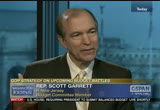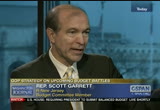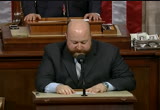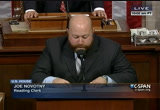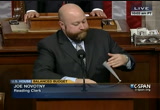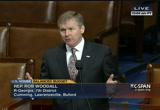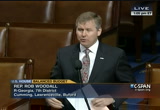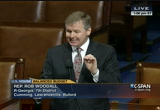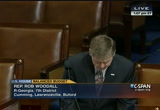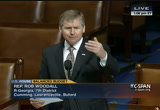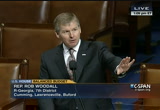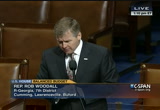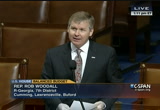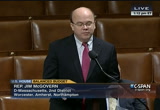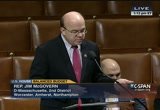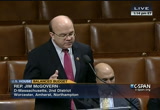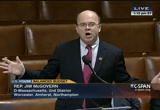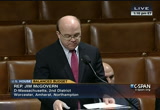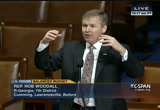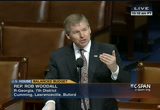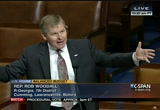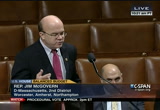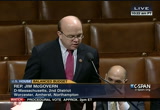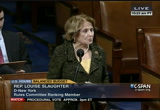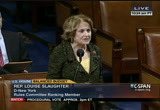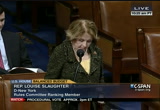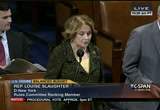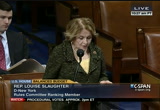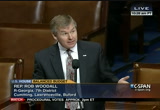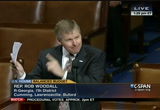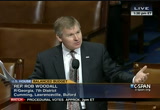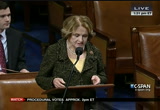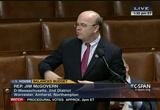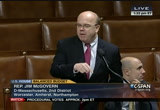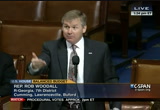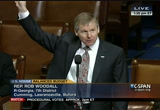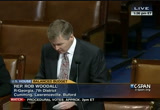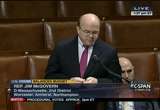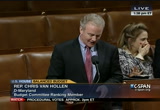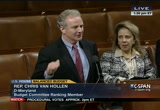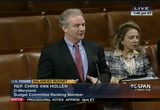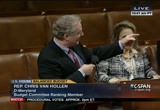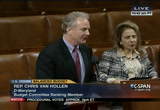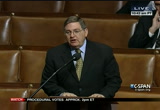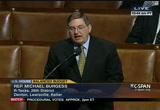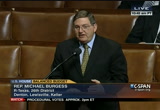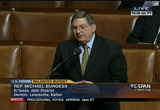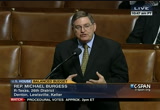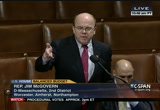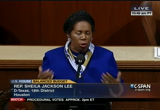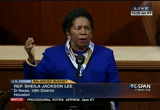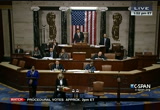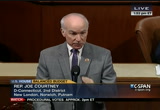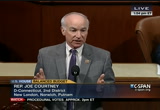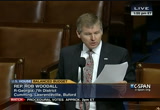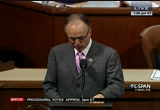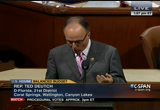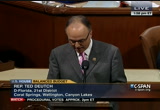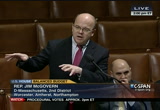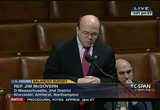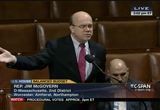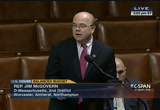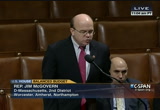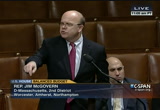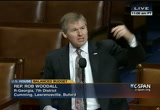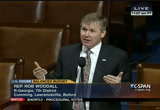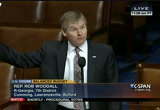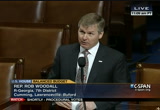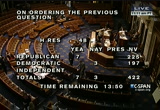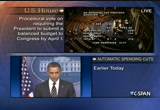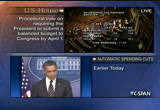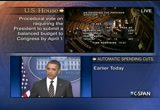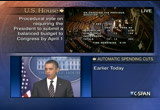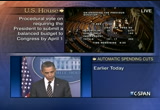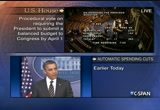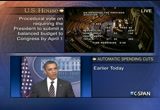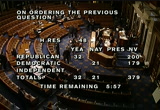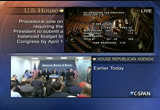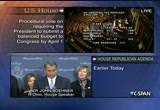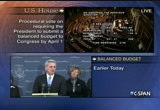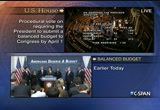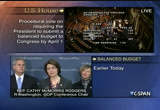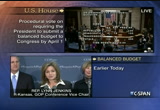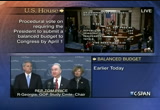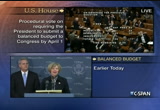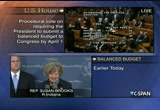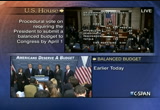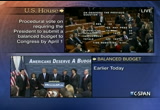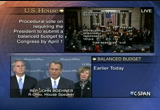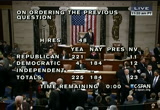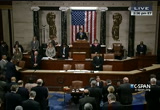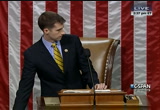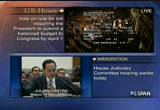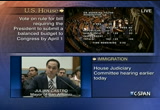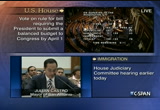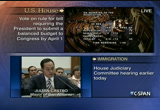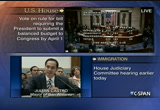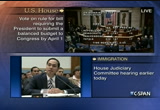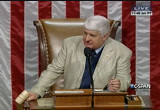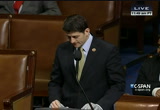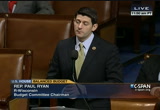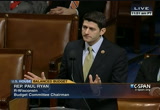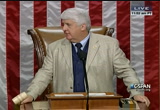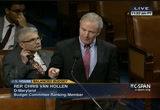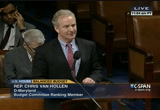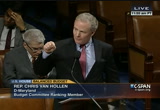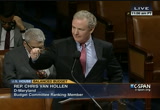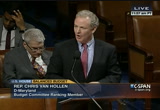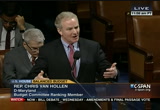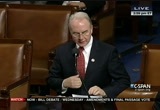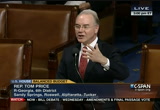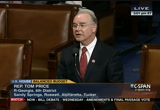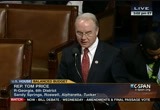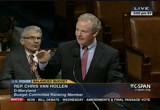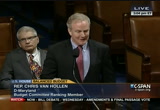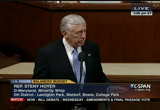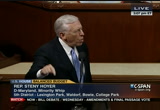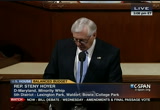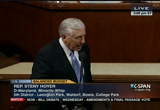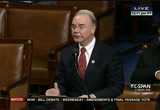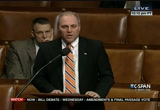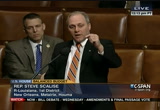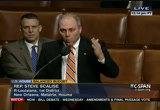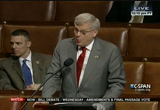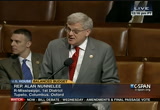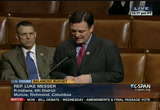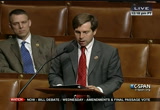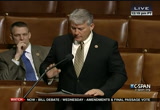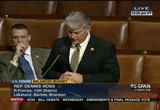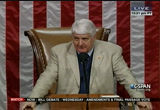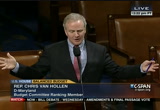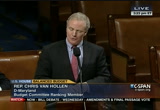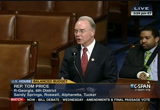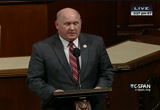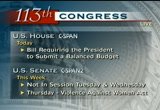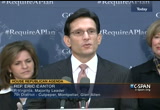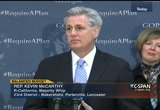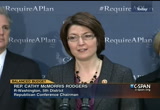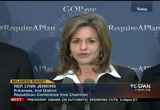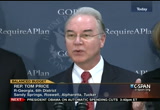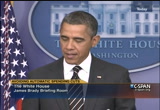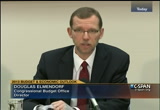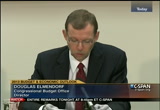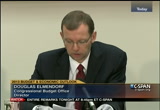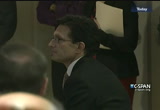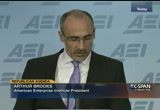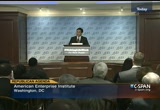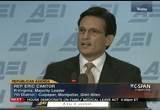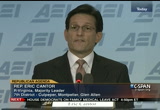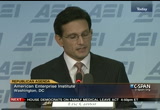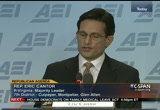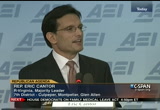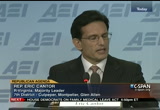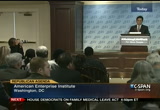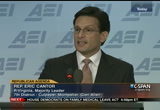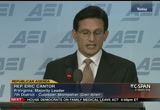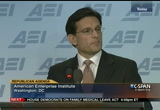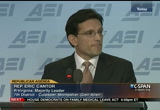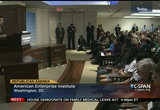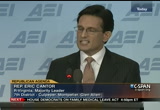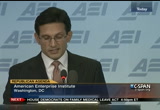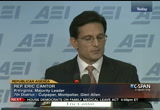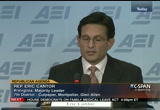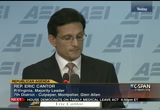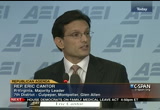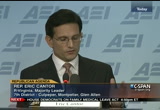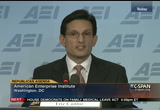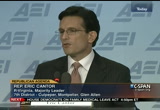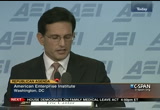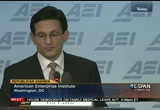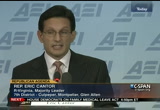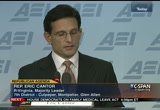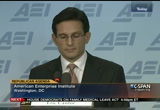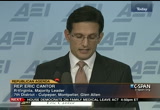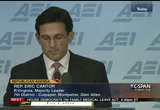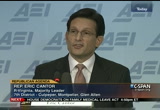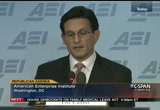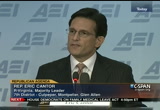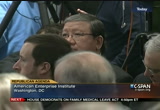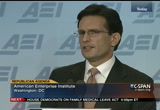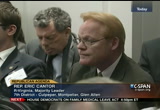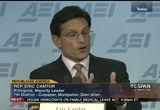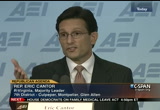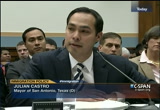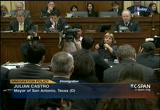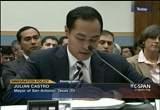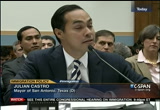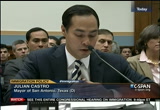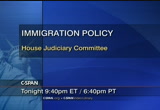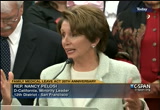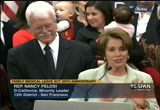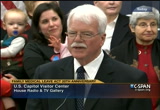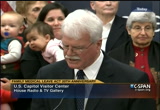tv Public Affairs CSPAN February 5, 2013 1:00pm-5:00pm EST
1:00 pm
haven't done it with sequester, see if we can figure it out. keep it at the spending level. that's the one everyone had agreed to in bipartisan manner. let's see if we can iron out some of these differences. i would hope at that point in time, that would be about four weeks after the sequester would have hit, maybe there would be enough pressure to begin to engage with to us try to solve some problems like the sequester. host: you call it a bipartisan agreement, sequester. right? the speaker came to the floor yesterday -- guest: what did he say? host: he kept referring to it as the president's sequester. guest: i say -- i'm talking about the fact that where did the sequester come from ultimately? it comes from the budget control act, right? and the speaker is more correct literally than i was because the idea for the sequester in the budget control act came from where? the white house. host: you voted for it, though,
1:01 pm
right? guest: no. host: it was approved. guest: it was approved. in a bipartisan manner. republicans and democrats. and the speaker supported it. but the speaker is correct. i stand corrected by the speaker. john boehner. maybe he'll say something later on. he is correct, the actual idea of the sequester itself came from president obama and the white house. host: so on twitter, we don't have a spending problem -- 7 >> our video library at c-span.org. the u.s. house has gaveled back in to begin debate on president obama to submit to congress a proposal for balancing the budget over the next 10 years. live coverage here on c-span. the speaker may, pursuant to clause 2-b of rule 18, declare the house resolved into the committee of the whole house on the state of the union for consideration of the bill, h.r. 444, to require that, if the president's fiscal year 2014
1:02 pm
budget does not achieve balance in a fiscal year covered by such budget, the president shall submit a supplemental unified budget by april 1, 2013, which identifies a fiscal year in which balanced is you a -- balance is achieved and for other purposes. the first reading of the bill shall be dispensed with. all points of order against consideration of the bill are waived. general debate shall be confined to the bill and shall not exceed one hour equally divided among and controlled by the chair and ranking minority member of the committee on the budget or their respective designees. after general debate, the bill shall be considered for amendment under the five-minute rule. the bill shall be considered as read. all points of order against provisions in the bill are waived. no amendment to the bill shall be in order except those printed in the report of the committee on rules accompanying this resolution. each such amendment may be offered only in the order
1:03 pm
printed in the report, may be offered only by a member designated in the report, shall be considered as read, shall be debatable for the time specified in the report, equally divided and controlled by the proponent and an opponent, shall not be subject to amendment and shall not be subject to a demand for division of the question in the house or in the committee of the whole. all points of order against such amendments are waived. at the conclusion of consideration of the bill for amendment, the committee shall rise and report the bill to the house with such amendments as may have been adopted. the previous question shall be considered as ordered on the bill and amendments thereto to final passage without intervening motion except one motion to recommit with or without instructions. the speaker pro tempore: the gentleman from georgia is recognized for one hour. mr. woodall: thank you, mr. speaker. and for the purpose of debate only i'd like to yield the customary 30 minutes to my friend from massachusetts, mr. mcgovern, pending which i yield
1:04 pm
myself such time as i may consume. the speaker pro tempore: the gentleman is recognized. mr. woodall: during consideration of this resolution, mr. speaker, all time is yielded for the purpose of debate only and i'd like to ask unanimous consent that all members have five legislative days to revise and extend their remarks. the speaker pro tempore: without objection. mr. woodall: thank you, mr. speaker. we're here today, as you heard from the clerk, mr. speaker, on the house resolution 48, which provides a structured rule for consideration of h.r. 444, which is the require a plan act. mr. speaker, this is a resolution that will require that the president, if he doesn't submit a budget that ultimately comes to balance, submit then a supplemental budget that shows how he would bring the budget to balance. as you know, mr. speaker, we've been grappling with serious budget challenges throughout this president's administration. we go back to f.y. 2009, the very first year of the administration, the deficit tripled, the previous record
1:05 pm
high deficit in this country, to $1.4 trillion. $1.3 trillion in f.y. 2010. $1.3 trillion in 2011, $1.2 trillion in f.y. 2012. and, mr. speaker, there's no plan that the administration has produced to get us from where we are, fiscal irresponsibility, to a point in the future of fiscal responsibility. mr. speaker, we've been doing our part here in the house, we've been proud to work together across the aisle in order to pass budgets that tackle those hard challenges that are ahead of us. if you go and read the president's comments, mr. speaker, you'll see that he recognized the challenges are hard. the question is, are we going to deal with those or not? i hold here, mr. speaker, a speech that the president made to the democratic national convention on september 6, 2012. where he said this, i will use
1:06 pm
the money that we're no longer spending on war to pay down our debt and put more people back to work. and my notes here said it was followed by extended cheers and applause. i suspect my friend from massachusetts supports that spirit wholeheartedly. that i will use the money we're no longer spending on war to pay down our debt and put more people back to work. but, mr. speaker, i also hold in my hand a transscript from the budget committee on which i have the pleasure of sitting, when we had the president's treasury secretary come before the budget committee to explain the president's budget, and i said this, i said, can you tell me just in simple terms, in true or false terms, does this budget never, ever, ever reduces the debt, is that right? treasure secretary geithner, uh, that is correct. it does not go far enough to bring down the debt. not just as a share of economy, but overall.
1:07 pm
you're right. it doesn't bring down the debt. at all. mr. speaker, that's the conflict that we face here as a people, as a country, not as republicans, not as democrats, but as a people. on the one hand, what our politicians are saying is we're going to use the money to pay down our debt. but what the reality is is that proposers are coming out today that never, ever, ever pay down a penny of debt. now, mr. speaker, if you want to see that for yourself, you can look. the president's budget each year is posted online, on the o.m.b. website. the first one he submitted, i hold the cover page here, was called a new era of responsibility. it was the first budget that the president ever submitted. but as i go through that budget, mr. speaker, what i see is projects -- proximates for 2020, for 20 -- projections for 2020, for 2030, for 2040, for 260 and
1:08 pm
for 2080 -- 20 of 6 -- 2060 and for 2080. you hear that, you have children. 2020, 2030, 2040, 2060 and 2080. and in each one of those years, according to the president's budget, not only does the budget never balance under his plan, but it continues to get worse. 2020, 2030, 2040, 2050, 2060, 2080. the president's budget. and i think that comes as news to so many of us, mr. speaker. i confess, because i've listened to all the speeches, just as my friend from massachusetts has. where we talk about getting the deficit under control or we talk about paying down the debt, only when you get into the plan do you see that we never pay down one penny. so this rule today, mr. speaker,
1:09 pm
would allow us to take up a bill that would require the president , for the very first time, to submit a balanced budget, doesn't have to balance the which balance it, doesn't have to balance the way you would balance it, but to submit a balanced budget and if he does not, within the current statutory time, as you know, mr. speaker, the statute actually requires that the president submit his budget yesterday, he's going to miss that deadline, but i'm expecting it soon and i'm looking forward to reading it soon. but that we actually give the american people a plan. and i want to say, because we heard it in the rules committee last night and i believe my friend from massachusetts brought it up and he was absolutely right, the history of deficits and debt in this country, mr. speaker, is not a mark of shame on the democratic party and it is not a mark of shame on the republican party. it is a mark of shame on all of us collectively. and you and i here, mr. speaker, and the big freshmen class of 2010, i'm less interested in
1:10 pm
finding out who to blame and i'm more interested in finding out who has a solution to solve the problem. this house passed a solution to solve the problem. i'd like to see the senate create a solution. i'd like to see the president create a solution. i'd like to see us discuss that solution as the mesh people, mr. speaker -- american people, mr. speaker. there are 14 amendments submitted to this piece of legislation, mr. speaker. we heard testimony on that in the rules committee yesterday. unfortunately six of those 14 amendments were nongermane, we were not able to make those in order. but we did make in order three republican amendments, one democratic amendment and one bipartisan amendment. in fact, all the members who came to the rules committee yesterday to testify on behalf of their amendments, we were able to make those amendments in order. mr. speaker, all this bill does, should it become law, is require that if the president doesn't submit a balanced budget, and
1:11 pm
certainly it's my great hope that he will, but if he doesn't, he share with the american people, again, not in five years, not in 10 years, whatever number he believes is the right way to set priorities, tell the american people what steps he will take to get us back to on track. candidly, mr. speaker, it's unconscionable that we can look at projections going out to 2080 and have folks never, ever, ever pay down one penny of debt. contrast that, contrast that with what we did here in the house of representatives, where with the budget that passed this house, the bipartisan vote that passed that budget, passed the only budget that passed anywhere in this town, not only would we have balanced the budget in that timeframe, mr. speaker, we would have paid back every penny of our $16.4 trillion federal debt.
1:12 pm
that's no small conversation. it's a conversation that's long overdue on this house floor, it's a conversation that has been too long ignored by both democrats and republicans and i'm pleased to be here today to take that up with my friend from massachusetts and then later on the underlying bill. with that i reserve the balance of my time. the speaker pro tempore: the gentleman from georgia reserves. the gentleman from massachusetts is recognized. mr. mcgovern: thank you, mr. speaker. i want to thank the gentleman from georgia, my good friend, for yielding me the customary 30 minutes. and i ask than consent to revise and extend my -- i ask unanimous consent to revise and extend my remarks and i yield myself such time as i my consume. the speaker pro tempore: without objection, the gentleman is recognized. mr. mcgovern: i urge my colleagues to vote no on this restrictive rule and to vote no on the underlying bill. the process here is awful. the bill before us was not even considered by the budget committee. they didn't hold a single hearing. no markup. and on a partyline vote last night the rules committee denied
1:13 pm
mr. value hon -- mr. van hollen, the ranking member of the budget committee, the opportunity to offer a meaningful substitute. the rules committee also on a partyline voted against an open rule. to all of the -- to all of the republican freshmen and sophomores who campaigned on the need for openness and transparency, by voting for this rule, you are officially part of the problem. this bill before us isn't a meaningful attempt to address the budget. it's a gimmick wrapped in talking points inside a press release. two weeks ago this house passed a so-called no budget no pay act. then they went on another recess. there wasn't a holiday, mind you. i guess it was the super bowl recess. now they're back with today's bill. it calls on the president to tell congress when his budget will come into balance, if his budget doesn't say when it will come into balance, then he must submit a supplemental statement telling congress when it will come into balance. why are we doing this? because the president is late
1:14 pm
submitting his budget for the next fiscal year. ok, fine. the president should submit a budget on time and support that. but lost in all of this republican budget theater is the truth. the reason the administration is late with their budget is because they just spent months trying to avert the disaster that was the fiscal cliff. as the speaker was trying in vain to corral house republicans into doing the right thing, we had plan b and plan c and plan who knows what. finally we reached a deal on january 1, technically after we went over the cliff. in the meantime, back in the real world, we are less than 24 calendar days away from the disastrous see quester taking effect. -- sequester taking effect. less than 24 days before cutting to defense and nondefense discretionary programs. cuts to jobs programs and medical research and education. cuts to military personnel and law enforcement. cuts that will cause jobs and do
1:15 pm
real harm to the american economy as it struggles to recover. and the reality is that we don't even have that much time. we only have nine legislative days left in february to address the issue. nine days to negotiate a trillion-dollar deal with the senate and the president. and instead of a meaningful plan to address the crisis that we need to avert, we have this nonsense before us today. this is no way to govern. the disturbing truth is that many republicans seem downright giddy when it comes to the sequester cuts. there is new story after new story of how we'll let the sequester take effect. the gentleman from georgia, dr. price, couldn't support these cuts fast enough. i was shocked. mr. speaker, it was only last week that the economic numbers for the fourth quarter of 2012 were released. unexpectedly we saw a contraction in those numbers, a
1:16 pm
contraction fueled by a massive reduction in defense spending. what do you know, huge cuts in government spending during a fragile economic recovery damage economic growth. the republican response is to double down on this stupid. these republican games are russian roulette with the american people must come to an end. it is time to replace short-term partisan political interests with the greater good. the president today is asking us to consider a thoughtful balanced plan to stop the sequester. i urge the republican leadership to bring that plan to the floor of the house for a vote as soon as possible. that's what the american people want, and that's what they deserve, a real plan. the bill before us today isn't, and i urge my colleagues to reject it and i reserve the balance of my time. the speaker pro tempore: the gentleman from massachusetts reserves. the gentleman from georgia is recognized. mr. woodall: thank you, mr. speaker. i thank my friend from massachusetts, because he's highlighting exactly wh our challenges are and exactly --
1:17 pm
what our challenges are and exactly why we should pass both the rule and h.r. 444 today. he went through item after item after item that have absolutely tied our economy up in knots. short-term problems and short-term solutions are trumping the discussion of long-term discussions on long-term solutions. you know, the sequester that he mentioned, mr. speaker, it was the month of may last year that this house first passed a replacement to the sequester. as you know and as history has recorded, the senate never acted on any replacement of a sequester, and now we talk about what happened on january 1 as if it was something that was created by this house, as if that fiscal cliff was something that this house invented. in fact, we have a very proud history, bipartisan history of looking further down the road
1:18 pm
to try to find the best answers and the best solutions to very serious problems. but we can't do it alone, mr. speaker. you know, one of the great successes we had just early in this year -- and by we i mean this entire house, the people's house -- we persuaded the senate to pass a budget for the first time in four years. all indications is this year, unlike last year and the year before that and the year before that, this year they'll pass a budget to lay out their plan. but what does it say, mr. speaker, about this house, about this process, about the future of this country that it's controversial whether or not the president of the united states should introdouse a budget that balances ever?
1:19 pm
ever. that's the debate today, mr. speaker. that's how out of touch washington has become. that's how confused the speeches have been written. we're debating a lot the president should introduce a budget that ever balances. i'm be a vow indicating, yes -- advocating, yes, he should, and others are advocating, no, that shouldn't be a requirement. when you take the oath to faithfully protect and defend the united states of america, it shouldn't be a requirement that you balance budgets. in fact, you should be free, not just for 10 years, not just for 20 years, not just for 40 years, not just for 80 years but forever to deficit spend, to borrow from a generation of children and a generation of grandchildren to pay for our
1:20 pm
wants today, taking away from their needs of tomorrow. it's controversial, mr. speaker. we're going to argue about it. this debate is going to come to a close and 40 minutes we'll vote in a rule and go to the vote on the underlying bill. there will be no votes on the board that say no, the president should never have to explain to the american people how we're going to make our fiscal tomorrow better than our fiscal too. i'd like to change his mind, mr. speaker, but for now i'm going to focus on changing the minds of right here in this chamber because if there is something that unites us in this body than reminds us it's a true love of this country, and i challenge anyone, mr. speaker, to define their love of our freedoms and of our
1:21 pm
country in a way that allows us to continue borrowing from the next generation forever. i reserve the balance of my time. the speaker pro tempore: the gentleman from georgia reserves. the gentleman from massachusetts is recognized. mr. mcgovern: mr. speaker, i yield myself such time as i may consume. i'd like to submit for the record a letter sent to the honorable paul ryan, the chairman of the committee on budget, from the executive office of the president of the office of management and budget which explains why the budget of this year is delayed because of the theatrics that the others did, trying to keep us from going over the fiscal cliff. i would say to the gentleman, submitting a budget is not controversial. what is controversial to me is the fact that so many my friends on the other side want to go over this sequester cliff in which millions of jobs will be lost. that to me is controversial.
1:22 pm
we should be about protecting jobs and creating jobs. my friends have plans, budgetary plans that would throw people out of work, and i find that unconscionable. i find that unconscionable. we should be lifting this country up, not putting people down. and the plans proposed by my friends on the other side, including this giddyness about the prospect -- giddiness about the prospect of going over the fiscal cliff would cost millions of people in this country jobs. it would hurt our economy. that's not the way we want to govern. that's what's controversial on our side. we don't want people to lose their jobs. we want people to keep their jobs and we want to create an economy that creates job. i yield to the gentlewoman from new york, the ranking member of the rules committee, three minutes. the speaker pro tempore: the
1:23 pm
gentlewoman from new york is recognized for three minutes. ms. slaughter: i thank my friend for yielding. mr. speaker, i do love my country and my country is begging me, as i'm sure all other members of congress, that for heaven's sake get this taken care of and have certainty. talking to constituents this morning they said they simply don't know what to do, and what we're doing here again is just theater, as my colleague pointed out. this isn't a plan. it's a gimmick, and it wastes valuable tume. cbs news reported this year it $24 million a week to operate the house of representatives. and on behalf of the taxpayers who pay those bills, we should be debating some serious legislation and come up with serious answers to our nation's procedures. and everybody has known from their grammar school days that the way to pass the bill, the house proposes a bill, the senate proposes a bill, they go through the committee processes, they are passed on through the committees, the subcommittees, then the major
1:24 pm
committee, then to the rules committee, in our case, and then we have a conference and we send it to the president. we don't do that any more. the last two bills we dealt with came directly to the rules committee. there was no committee action whatever. there was no discussion. there was no input. and yesterday on this, what really i think grieves me most is that there was a wonderful substitute put forward with great sincerity by the ranking member of the budget committee, mr. van hollen. i think he's respected by all sides and most of this country for his wisdom and for his acuity. but could they put his substitute in order? no. they said it had to have a waiver. that's what the rules committee is for. that's what the rules committee does. the budget committee has 18, at least, waivers. it just defies imagination. this is $24 million again this week where we're brought in
1:25 pm
from all corners of the united states at expense to sit here and do absolutely nothing. if they want to know what the president wants to do they should call up and ask him. we don't have to do a resolution or a bill on the floor of the house to do that. if that's so important. what a crazy time we could do in this time of communication to say, this is the way we are going to find out something. and find out what? the drastic across the board spending cuts are going to take effect on march 1. week after next we are going to take another week off. we work about 2 1/2 days here. it's really unfortunate. i think i can use that word without being called down. i have much stronger ones in my head. but instead of solving that looming crisis, again, they proposed legislation that tries to change the subject. try as they might to hide, the
1:26 pm
american people need help. we are days away from a self-inflicted wound. may i ask for extra time? mr. mcgovern: i give the gentlelady two minutes. the speaker pro tempore: the gentlelady from new york is recognized for two minutes. ms. slaughter: if the sequester would take effect there would be drastic cuts to important programs, not only domestically. but secretary panetta said it would hallow out the military and leave our military fighting with one hand behind its back. why would we put the united states through that? taking together the cuts as said before would destroy jobs, would reverse our economic recovery and destroy the middle class. to get a glimpse of what drastic spending cuts would do to our economy, look back at the end of 2012. as leading counsel have all pointed out, the drastic spk spending cuts at the end of last year are the leading
1:27 pm
causes, the leading causes of our recent economic stagnation. should the sequester take effect, our economy would suffer even more and jobs will be lost as deeper and deeper spending cuts take effect. is that the path the majority wants to walk down? because if they keep spending our time debating stupid legislation like this we will find ourselves on that path before too long. i agree with mr. mcgovern that many of our colleagues seem to want to go off that cliff for some kind of foolish exercise. knowing full well what is going to happen, and that is really shameful. yesterday, our democrat colleagues and i supported legislation that would stop the sequester with mr. van hollen's substitute but, no, they would not do that. it was simply cast aside. the majority chose to move forward with this restrictive and partisan process, closed rule again, that ignores the problems before us and moves forward with a political gimmick. as the clock continues to tick,
1:28 pm
i urge my colleagues to stop those gimmicks and get back to work. again, i spoke with people today and they said some certainty has to be in this government. people have to know what the economic certainty has to be. we don't want to play russian roulette with the economy day after day and week after week. i urge my colleagues to stop wasting the valuable time and let's provide that certainty and yield back the balance of my time. the speaker pro tempore: the gentlelady yields back the balance of her time. without objection, the documents introduced by the gentleman from massachusetts will be included in the massachusetts. the gentleman from massachusetts reserves. the gentleman from georgia is recognized. mr. woodall: thank you, mr. speaker. i want to say to my friend from new york for whom i have tremendous respect and value her counsel, to call this a stupid piece of legislation i think really misses the point about what we're doing here. i'd encourage you to ask your constituents in new york, mr. speaker, i'd encourage you to
1:29 pm
ask your constituents back home, do folks realize -- because i didn't -- that in the four years that the president's been president of the united states, the budget that he's introduced never -- my friends on the other side are making a persuasive case of why they would support doing things with different priorities than i would support doing things. that's absolutely going to be true. when we debate the budget resolution, we are going to have different approaches for getting the balance. but the president's budgets never get there. if we give him every spending cut he asks for, if we give him every tax increase he asks for, if we do absolutely everything that the budget he's required by law to submit requests, we will begin to pay down the first penny of debt never.
1:30 pm
in fact, if we do absolutely everything that the budget he's required by law to submit to us asks, the debt will continue to grow forever. i agree with so much my friends on other side are saying about the sequester, about the fiscal cliff. that's why we acted in may on this body, that's why we passed another sequester replacement in august, that's why we passed another one in december. i agree. but can't we also agree that if you're going to be commander in chief of america, if you're going to be the president of the united states, if you're going to uphold and defend the constitution, and we have our former joint chiefs of staff chairmen telling us that our greatest national security threat is our growing debt,
1:31 pm
shouldn't it be fair to ask the president to tell us when, if ever, he plans to begin paying back the first penny? mr. speaker, it's not a stupid piece of legislation that we're dealing with today. what's almost laughably ridiculous is that it's controversial. ms. slaughter: would the gentleman yield? mr. woodall: i believe the gentleman has much more time. i'd be happy to reserve the balance of my time and allow the friend to control. the speaker pro tempore: the gentleman from georgia reserves. the gentleman from massachusetts is recognized. mr. mcgovern: i yield the gentlelady from new york two minutes. ms. slaughter: i see my colleagues coming to speak so i'm going to be as brief as i can. i know that the chair of the budget committee has said that he can balance the budget in 10 years. which most economists and people say, will certainly throw us into the worst depression, worse than 1929. i believe that what we're doing
1:32 pm
here, i can't prove it, but my suspicions are that this is something intended to cover that. they're trying to get the president into that trick box or something, to try to do the same thing. don't go, mr. president. we can do better than that. thank you very much. i yield back. mr. mcgovern: mr. speaker, may i yield myself such time as i may consume? the speaker pro tempore: the gentleman is recognized. mr. mcgovern: mr. speaker, the issue is not whether the president should submit a budget. he should. and he would have submitted a budget by now but because of the theatrics that my friends on the other side put us through dealing with the fiscal cliff, which was just solved on january 1, things are a little bit delayed. but the issue is why is the house wasting time on this while the sword of the sequester hangs over the american people? you know, the president can submit any budget he wants. that's what the president has a right to do. just like george bush submitted whatever budget he wanted to do. we have a job here in this house. and that is to address this looming fiscal crisis called the sequester.
1:33 pm
and what we're doing here today is doing nothing at all to move that ball forward. in less than a month arbitrary cuts are going to go into effect and people are going to lose their jobs and this economy is going to go into a deeper slump. and for the life of me i can't understand why there's not more urgency. we should be taking vacations, we actually should be working here and trying to resolve this. yet instead we're bringing these -- this is stupid legislation because it is not addressing the crisis. it is doing nothing to advance the cause of trying to get to a solution. this is just a press release. this is just yet another gimmick. and i think the reason why congress and the -- and especially the house of representatives is held in such low regard is because we spend so much time on trivial matters, debatings passionately and we skip over debating the important things. we ought to be doing something important here today. we ought to be trying to avert this sequestration. we ought to be trying to keep people in their jobs.
1:34 pm
we ought to be trying to create an economy that will create more jobs, not this theater. i reserve the balance of my time. the speaker pro tempore: the gentleman from massachusetts reserves. the gentleman from georgia is recognized. mr. woodall: thank you, mr. speaker. there's a reason that we're spending so much time talking about things other than the underlying bill. other than the rule. and the reason is because the rule's a good rule and the bill's a good bill. and we can use this time for the political theater that my friend from massachusetts appears to disdain. but i would say, he's got a talent for it and he should not disdain it so rapidly. mr. speaker, we handled the sequester in may. i hope whenever my friend from massachusetts refers to his friend on the other side he means the other side of the chamber. not the other side of this house. because we, you and i, acted, mr. speaker. to solve those issues. mr. mcgovern: this is the 113th congress. mr. woodall: i'd be happy to yield. mr. mcgovern: this is the 113th congress. we haven't done one thing to solve this fiscal crisis that's looming on march 1.
1:35 pm
this is the 113th congress. under the constitution when a new congress begins, you have to start all over again. mr. woodall: reclaiming my time. my friend is exactly right. of all of the multiple efforts that we did last year that were all rejected by the other side, we have not recreated those efforts again this year. he's exactly right. what we have done, however, is created a pathway that's going to produce the first budget on the senate side, the first opportunity for the bodies to come together in conference. my friend from new york tells us about, i'm just a bill and what school children are learning all over america. mr. speaker, they're going to have to learn it on tv because they have not seen it in this town. we can't. we can't go to conference on a budget unless the senate passes one. and this year, this year, mr. speaker,, as governed by the rulebook, the united states constitution, that i have right this here in my hand, we're going to be able to get that done. that's the kind of work this house is doing. that's the groundwork that we're laying. and my friend from new york's
1:36 pm
exactly right, mr. speaker. when she says that this body, led by chairman ryan on the budget committee, is going to produce a budget so serious and so responsible it's going to come to balance, the balance that the american people are demanding, faster than any other budget we have seen in this president's administration. all we're asking, mr. speaker, doesn't it seem reasonable to let the president submit any budget he wants to, don't want to change the budgets he's submitting at all, but just to share with the american people, because they don't know, when they come to balance. who knew, mr. speaker, when the budget was entitled a new era of responsibility that it wasn't going to come to balance in 80 years? who knew? i didn't. there are people in this him
1:37 pm
that ber, mr. speaker, who did not know -- chamber, mr. speaker, who did not know that in four years of his presidency, this president has never, ever, ever, assuming a world where he gets everything he wants, crafted a plan that begins to pay back the very first penny of our debt. that's dangerous, mr. speaker. this bill, this bill can put a stop to that process. that's why i know it's going to get support here in the house. i reserve the balance of my time. the speaker pro tempore: the gentleman from georgia reserves. the gentleman from massachusetts is recognized. mr. mcgovern: thank you, mr. speaker. this bill does nothing. it does absolutely nothing. it's a press release. mr. speaker, if we defeat the previous question, i will offer an amendment to the rule to ensure that the house votes on mr. van hollen's replacement for the sequester. which was blocked yesterday in the rules committee. my friend from georgia talks about this being a good rule. and a good process. this bill was -- was not even considered by the budget committee, which is the
1:38 pm
committee in jurisdiction, it had no hearings, had no markup. it mysteriously appeared at the rules committee and we wanted an open rule, we were denied an open rule. mr. van hollen had a substantive amendment to replace the sequester. that was denied. so i want to yield to the ranking member of the budget committee, mr. van hollen. the speaker pro tempore: the gentleman from maryland is recognized for five minutes. mr. van hollen: thank you, mr. speaker. and i thank my colleague, mr. mcgovern, who said it exactly right. this unfortunately is another political gimmick we've seen from our republican colleagues and it is exactly why the american people hate this congress so much. rather than doing something to create jobs, rather than doing something to help support the economy, this does absolutely nothing other than point fingers at the president because his budget is a little late and then tell the president that he has to submit a budget that meets the republican requirements
1:39 pm
rather than what we've done with every other president which gives them the ability to present the budget they like. now, with respect to the delay, our republican colleagues know very well what the cause of that delay was. the cause of the delay was we were working very hard to try and avoid the fiscal cliff which would have hurt jobs and the economy. i'm not surprised some of our republican house colleagues have for then about that. because they overwhelmingly voted against the fiscal cliff agreement, which by the way was supported by the overwhelming majority of senate republicans. but here on the house, republicans in great numbers said that they would rather risk the economy and risk jobs than ask the very wealthiest americans to pay a little bit more. and that's why the fiscal cliff agreement took so long. we didn't get it done until january 2. now, i would hope my colleagues on the budget committee know that if you're putting together a budget, you need to know what
1:40 pm
you're spending but you also need to know what your revenues are. and until we were able to get that agreement, the president didn't know what the revenues were. now, nonpartisan groups like the congressional budget office and joint tax, they were also delayed in their assessment. nonpartisan groups. now, the shame of it is, instead of playing these political games, we should do what my colleagues have said we should do, we should be focused on avoiding the sequester, the meat axe across-the-board cuts and this house has taken no action in this congress, in this 113th congress, to deal with that. and so we on the democratic side said, hey, let's give our members an opportunity to vote on something. to replace the sequester. to do it in a balanced way. so that we don't hurt the economy. and that we don't put jobs at risk. and so we brought a substitute amendment to the rules committee that would have prevented those
1:41 pm
across-the-board cuts, would have replaced them with balanced and sensible alternatives. like, for example, eliminating direct payments in agriculture subsidies. like getting rid of the taxpayer subsidies for big oil companies. that we would replace the across-the-board meat axe cuts that do great harm to our economy with those sensible measures. and the response from our republican colleagues -- you don't get a vote. you don't get a vote. they rush to the floor a measure that hasn't had a single hearing? that didn't go through the regular order. and in keeping with that philosophy, we don't even get a vote. a vote on something that is important to the american people, which is to replace the across-the-board sequester which we know is going to hurt jobs, because we just heard from the last quarter economic report that even the fear of those across-the-board cuts was having a damaging impact on the economy. even the fear of it. and now within less than a month it's going to happen and here
1:42 pm
we're talking about a political gimmick bill instead of something that does something real. and not even allowed a chance to vote on a proposal to replace the sequester. vote against it if you want. vote against it. that's the way the democratic process works. but allow this house to work its will. when this house worked its will we were able to get a fiscal agreement. -- agreement passed and avoid going over the cliff and hurting the economy. well, let's do the same thing now. let's just have a vote. up or down on the merits of a substitute proposal rather than playing games with this very unfortunate proposal that does nothing but play politics. and with that, mr. speaker, i yield the balance of my time and thank my colleagues on the rules committee. the speaker pro tempore: the gentleman from maryland yields back. the gentleman from massachusetts reserves. the gentleman from georgia is recognized. mr. woodall: mr. speaker, i yield myself 30 seconds just to say to my friend, i haven't
1:43 pm
actually mentioned that the president's budget was late. you're exactly right. he did miss his statutory deadline. he's not going to make it on time. in fact, there's a story that it's not going to get here until march, mr. speaker, and the years that i've had a voting card he's never submitted a budget on time. i'm not asking him to get it here on time. i'm only asking him, when it gets here, would he tell us when it's going to balance? and with that i'd like to yield four minutes to my friend from texas -- the speaker pro tempore: the gentleman will suspend. the gentleman from maryland will suspend. the gentleman from georgia controls the time. mr. woodall: thank you, mr. speaker. i'd like to yield four minutes to a colleague on the rules committee, the gentleman from texas, dr. burgess. the speaker pro tempore: the gentleman from texas is recognized for four minutes. burgeburge i thank the gentleman for yielding -- mr. burgess: i thank the gentleman for yielding and this is an important discussion that we're having today and i urge my colleagues to vote for the rule and vote for the underlying bill that follows. look, the president's going to be here talking to us next week. he'll deliver his state of the union address. he will do so without a plan.
1:44 pm
on the table there will be no budget, we will not know about the proposals that are put forward as to whether or not they're reasonable in the context of allocations. we just simply don't know. now the underlying bill that's being discussed today is that when the president does submit that plan, when the administration does submit that plan, that if that plan does not come into balance within a reasonable period of time, 10 years, i think any american would say, is a reasonable time. if it does not come into balance, give us an idea as to when you think that will happen. after all, when there was a campaign being run in 2008, the presidential candidate for the democrats said that he'd cut the deficit in half in four years. and we're still waiting. we would like to see the plan that is going to achieve these goals. now, look, we're also hearing a lot of talk today about the sequester. it's not the purpose of this legislation to deal with the sequester. we did have reconciliation bills
1:45 pm
on the floor of this house in may and then again in december. we had a bill dealing with the expiration of the tax codes right before the august recess. so there were opportunities to talk about the fiscal cliff. i for one felt that the delay in the sequester on january 1 was not in the country's best interest. these were the cuts that the congress promised to the american people when the debt limit was raised in august of 2011, this was the promise that was made and it was a promise that was made by the president. it was proposed by -- it was proposed by people within the administration. the bill was signed into law by the president. the president cannot now come back and retroactively veto a bill that's already been signed. this is settled law. and these are cuts on which the american people are depending, their depending on us to keep our word. it's very difficult to cut spending, it's very difficult to cut the budget. every line in the federal budget has a constituency.
1:46 pm
every line in every appropriations bill has a constituency somewhere that cares deeply about that language being retained. so an across-the-board cut, when all else fails, an across-the-board cut may be the only way that you can ever achieve that spending restrainlt. now, i understand that the white house does not agree with the republican house that there is a spending problem. they think it's a revenue problem. well, great. put that in writing. put it in the budget. tell us when that revenue that you wish to achieve will bring this budget into balance. i for one don't think it's possible but i would like to see the academic exercise that they would at least try to get to a balance at some point in the future. finally, mr. speaker, i hate to do a history lesson, but when the republicans were in the minority in this house, there was a very large bill that was passed and it was called the affordable care act. this was a bill that did not receive a hearing in the house
1:47 pm
of representatives. to be sure, h.r. 2200 had received markup and a hearing in the house, but h.r. 3590, although it had a house bill number, was not a house bill. it was a housing bill that passed the house of representatives in july of 2009, went over to the senate and was commotely changed in the senate finance committee and this was the bill that came to the house of representatives on which we had to vote in a very short period of time. no amendments were allowed. it was a very closed process. i was in the rules committee that night. i remember the ranking member being there and all of the good ideas that i thought i brought forward were all excluded from discussion. so don't lecture me about the process that this bill was rushed and didn't have a hearing. for heaven's sake, we have a bill that is now signed law that cost $2.6 trillion over the next 10 years that never had a hearing in this house. es that the travesty and that's why -- that's the travesty and that's why we have to deal with spending.
1:48 pm
the speaker pro tempore: the gentleman's time has expired. the gentleman from georgia reserves. the gentleman from massachusetts. mr. mcgovern: i say to the gentleman from texas, he's wrong. he's on the energy and commerce committee. the affordable care act had hearings in the energy and commerce and in markups. there was multiple hearings on that bill. i don't know what he is talking about. the gentleman from georgia said that the bill that he's toting here mentions it in his very political-inspired findings. read your own bill. three pages long. i know it may be too much. we're all told to read the bill. rather than being here telling the president what to do, he's going to submit a budget. we have to do our job and our job is to avoid the sequestration. because if we don't there are millions of people in this country who will be without work, there will be programs that will be arbitrarily cut, this economy will be hurt. if you want sequestration then you continue to take your recesses and do this kind of trivial stuff on the house floor, but we ought to be finding a way to avoid going
1:49 pm
offer the sequestration cliff. at this point, mr. speaker, i'd like to yield two minutes to the gentlewoman from texas, ms. jackson lee. the speaker pro tempore: the gentlewoman from texas is recognized for two minutes. ms. jackson lee: my friend from massachusetts is absolutely right. what most america is waiting for is for us to address the very abyss that we put ourselves in, the cliff we put ourselves in. the fact that we became hostage to this idea of a commission that was necessary because we could not get members on both sides of the aisle to be able to work together on what should be cut. that's why my friends on the other side of the aisle had members who did not understand how government function. republicans did not understand that congress is a rainy day umbrella, this we are supposed to serve the america people. people can say that rome is burning or the cities and towns of economy are asking us to finally answer the question.
1:50 pm
under the laws that we adhere to, the president has a right to submit his budget. that should be very clore. no legislation here on the floor is going to dictate the president's budget. there is a law that is supposed to be said the first monday in february. we will admit that. what president has ever had -- what president has ever had the hostage-taking of the debt ceiling so you can't write a budget if there are individuals in the congress that won't do the normal business which is to raise the debt ceiling so that the american people can be taken care of? as we speak, however, the president has introduced today a short-term fix to avert the sequester. the democrats have offered a way of avoiding the sequester. we have nothing from the republicans except a resolution that says a request for a plan. the very plan that the president knows by law he's going to submit as long as he knows what is the amount of money we have to work on and of course the budgeting process is going through the house, the chairman of the budget, mr. ryan, the ranking member of the
1:51 pm
budget, mr. van hollen. we all know the regular order. we are going to do our work. but putting us on the floor today and ignoring what we should be doing, i'm saddened that my amendment that indicated i wanted to make sure that the most vull vulnerable in any budget, -- vulnerable in any budget, 21% of our nation's children, i wanted to have a sense of congress that whatever we did we would not do anything to harm these vulnerable children who to no fault of their own -- through no fault of their own may be suffering from the kind of economy or their parents are suffering so that they live in poverty. whatever we do we should not do anything more to make their life more devastating. may i get 10 seconds? mr. mcgovern: i yield the gentlelady 10 seconds. ms. jackson lee: my other amendment had to deal with the estate tax to raise revenue and that would be a reasonable debate to address what we can do to make the lives of americans better. request a plan. a plan is not action. the president does a budget.
1:52 pm
we do a budget. mr. speaker, let's do our work and help the american people and avoid the sequester. i yield back. the speaker pro tempore: the gentlelady's time has expired. the gentleman from massachusetts reserves. the gentleman from georgia is recognized. mr. woodall: mr. speaker, i yield myself 30 seconds to say to my colleague that i share her great passion for america's children. and protecting america's children. and i would say to my friend that i don't believe we can continue to operate under budgets that borrow from those children, not just this year, not just next year, but forever and candidly say we are protecting them. we are putting our most vulnerable at risks with these budgets. i'd be happy to yield. ms. jackson lee: i thank the gentleman. i don't think -- i don't think anyone on this side of the aisle is not prepared to work collaboratively on the question of the deficit, on the question of growing america's economy and working with our children. can we find common ground that indicates we must --
1:53 pm
the speaker pro tempore: the gentleman from georgia's time is expired. ms. jackson lee: likewise talking about debt and deficit and that's what these democrats are talking about, investing in our children, making their lives better. i yield to the gentleman. thank you. the speaker pro tempore: the gentleman from georgia reserves. the gentleman from massachusetts is recognized. fwoverpbgoverpb we all want to make sure -- mr. mcgovern: we all want to make sure that our children is protected. cutting things like head start, that's no way to protect our children. at this point i yield two minutes to the gentleman from connecticut, mr. courtney. the speaker pro tempore: the gentleman from connecticut is recognized for two minutes. cortland finnegan mr. speaker, in 23 -- mr. courtney: mr. speaker, in 23 days, a chainsaw will go through all sectors of the government. secretary of defense leon panetta sunday, along with general martin dempsey, chairman of the joint chiefs, very bluntly warned this country if sequestration goes into effect america's military readiness will be damaged in a very critical way. the navy has told us specifically what this means.
1:54 pm
23 ships whose repairs are scheduled will be can delled. 56% of flying hours on aircraft carriers will be canceled. 22% of steaming days for the u.s. fleet will be canceled. submarine fleets will be canceled. we have the u.s.s. stennis and u.s.s. eisenhower stationed in the middle east to make sure that protecting the straits of hormuzz, they have to have aircraft that can fly -- hormuz, they have to have aircraft that can fly. they can't expect to carry out their mission. yet, in 23 days, because of inaction bay this chamber, we are putting again america's national security interests at risk. the bipartisan policy center, founded by bob dole and tom daschle, has told us we will lose a million jobs if sequestration goes through so those shipyards that are planning to do that repair work, they're basically going to get layoff slips. and we are debating a bill today that has absolutely no connection to those realities.
1:55 pm
this is a pure political stunt. it has no bearing in terms of whether or not the military readiness of this country, the economic recovery on the right direction right now, is going to be protected and preserved. that's our job. that's what we should be focused on today. and denying the van hollen amendment which would replace that jeags is why this -- sequestration is why this rule should be defeated. i ask members on both sides of the chamber vote no on this. i yield back the balance of my time. the speaker pro tempore: the gentleman from georgia is recognized. mr. woodall: mr. speaker, i'll yield myself such time as i may consume to -- the speaker pro tempore: the gentleman is recognized. mr. woodall: read from the president's inaugural address that took place just outside our back door here. he said, we must make the hard choices to reduce the cost of health care and the size of our deficit. he didn't say we should make the easy choices because there aren't any easy choices to make. every single one of them is
1:56 pm
hard. i have great respect for those that made the hard votes. i say, mr. president, put your budget where your speeches are. we can't begin to pay down the debt until we stop running up the debt. and we have yet to see a budget from this president that puts us on that path. i reserve. the speaker pro tempore: the gentleman reserves. the gentleman from massachusetts. mr. mcgovern: mr. speaker, i'm -- i'd like to yield two minutes to the gentleman from florida, mr. deutch. the speaker pro tempore: the gentleman from florida is recognized for two minutes. mr. deutch: thank you, mr. speaker. mr. speaker, i rise today disappointed that my amendment to the require a plan act has been left out of this rule. this bill is bad political theater. not even the devastatingly dangerous ryan budget could achieve a balanced budget in 2014 this bill demands of the
1:57 pm
president. setting the sillyness aside, my amendment would address a separate issue. this bill's use of the phrase unified budget and the inclusion of social security as part of that unified budget, this is a blatant attempt to nullify social security's historic independence from the federal budget. social security is funded by the payroll tax. it was created with its own revenue stream so these hard-earned benefits would never fall victim to the political shenanigans of a congress like this one. as president franklin roosevelt said, quote, with those taxes in there, no damn politician can ever scrap my social security. mr. speaker, social security is not an item in the budget. it is social insurance that protects all americans against des tution due to old age, a disability or illness or the death of a breadwinner. workers have built up $2.7 trillion in the social security trust fund which ensures that
1:58 pm
benefits will be paid in full at least until the mid 2030's. i have called for small adjustments to strengthen social security for the long term, and i'm ready to have that debate. but to put social security on the general budget's ledger as americans -- as america's largest generation retires is simply beyond the pale. this bill, mr. speaker, puts social security on the g.o.p. chopping block. this is a dangerous precedent. we cannot allow the accounting tricks in this bad legislation to endanger the social security that keeps so many americans financially secure. president truman, mr. speaker, said, and i quote, social security is not a dole or a device for giving everybody something for nothing. true something must consist of rights which are earned rights which are guaranteed by the law of the land, closed quote. today, mr. speaker, these earned rights of millions of americans are in jeopardy as is that guarantee. we must vote down this rule, and we must vote down this bad
1:59 pm
bill. i yield back. the speaker pro tempore: the gentleman's time has expired. the gentleman from georgia is recognized. mr. woodall: thank you, mr. speaker. i yield myself 60 seconds to say that i hope it gives him comfort to know there is nothing in this legislation that changes any of those commitments that he read there on the house floor. in fact, i would say the opposite's true. as someone who's going to retire after social security is protected to have gone bankrupt, i think it's critically important that every budget we look at looks at how it is we are going to pay back all of those government bonds that this congress has swapped the cash in the social security trust fund for without paying back those bonds, there is no social security check to go out the door. the reason we talk about balanced budgets is not because numbers are important. we talk about balanced budgets because commitments are important, and we cannot, we cannot meet our medicare commitments, we cannot meet our social security commitments, and everybody in this body
2:00 pm
knows it. every president's budget shows it. but we can do better, and working together we will do better, mr. speaker. i reserve. the speaker pro tempore: the gentleman reserves the balance of his time. the gentleman from massachusetts is recognized. mr. mcgovern: may i inquire of the gentleman from georgia how many more speakers he has? wood wod i'd say to my friend -- mr. woodall: i'd say to my friend i'm prepared to close. mr. mcgovern: i'd say i am prepared to close. the speaker pro tempore: the gentleman is recognized. mr. mcgovern: mr. speaker, this is a very frustrating debate in large part because it's much ado about nothing. what we're doing is a press release, it's doing nothing at all to avoid this prospect of sequestration in which arbitrary cuts will go into play. this is just more talk and talk and talk and talk. . we should be working. would he should be coming to some sort of agreement to avoid the catastrophe of sequestration but we are doing this. i want to put some things in
2:01 pm
perspective. the center for american progress reported that since the start of fiscal year 2011, president obama has signed into law approximately $2.4 trillion of deficit reduction for the years 2013 through 2022. nearly 3/4 of that deficit reduction is in the form of spending cuts. while the remaining 1/4 comes from revenue increases. congress and the president have got cut about $1.5 trillion in program spending. and generated about $300 million in interest savings for a combined total of more than $2.4 trillion in deficit reduction. that's a quote from the american center for american progress. 3/4 of the deficit reduction we have achieved so far was from spending cuts. but my friends on the other side have the nerve to continue to claim the democrats are, quote, loathe to end -- agree to spending cuts. give me a break, mr. speaker. give me a break.
2:02 pm
c.b.o. projects federal deficits -- the federal deficit to be about $845 million, which i think is high, but it's the first time the nonpartisan office forecast a deficit below $1 trillion. we are going in the right direction and the president wants to continue to move in that right direction in a fair and balanced way. now, here's the deal. my friends keep on referring to what they did last year which again was last year, where you have to get them to think about this year because they have to act now. it's a new congress. last year the proposals they came up with to try to bring our budget to balance were all about lowering the quality of -- lowering the quality of life for our citizens. their budget proposal ended medicare as we know it. ended medicare. it's gone. my friend from florida talked about social security. their plan for social security is to privatize it. and deep reductions in cuts to provide support for people who are most vulnerable. that's their plan. and now we see, because we are
2:03 pm
not trying to address this latest fiscal cliff, i think they really do want the sequestration to go into effect, i think that is outrageous. i think it is going to be damaging to our economy. but what their plan by allowing sequestration to go into effect is basically to try to balance the budget by making more people unemployed. we will lose jobs in a defense sector that's already happening, but then we are going to see losses in jobs in other areas. there will be cuts in education, police grants are cut, payments to medicare providers are cut. and "the new york times" report that even the aid approved for victims hurricane sandy will fall under this act. this is how we are going to solve our budgetary problems? yes, we do have a big debt. a lot of it has to do with these unpaid-for wars with these tax cuts that weren't paid for. it's going to take us a while to get out of it. as we get out of it we can't destroy our country. we need a balanced approach.
2:04 pm
we need to cut where we can cut. revenues where we need to raise revenues, but also need to invest. cutting the national institutes of health which will happen if sequestration goes into effect will not only cost jobs but will prolong human suffering. we could find a cure to parkinson's disease or alzheimer's disease, not only will we prevent a lot of human suffering, you will end up solving the budgetary challenges of medicare and medicaid. there is value in investing in these things, not arbitrarily cutting them. last night in the rules committee, we tried to bring some substance to this debate. mr. van hollen had his -- had his amendment which was blocked. the one substantive things thing that we could have done here today to avoid sequestration was blocked. so, mr. speaker, if we defeat the previous question, i will offer an amendment to the rule to ensure that the house votes on mr. van hollen's replacement for the sequester, which was again blocked last night in the rules committee. i ask unanimous consent to insert the text of the amendment in the record along with extraneous materials immediately
2:05 pm
prior to the vote on the previous question. mr. speaker, again i would urge my colleagues to reject this rule which again is illustrative of how closed this process has become in this house. reject the rule because it is not opened. the budget committee never even considered this bill. we also reject the underlying bill because this is nonsense. at a time when we should be doing something real to avoid a real catastrophe in this country, avoid something that will have an adverse impact on our economy. instead we are all fiddling why rome is burning. this is outrageous. we could do so much better. we ought to work. passing resolutions asking the president to do x, y, and z we ought to pass a resolution to instruct us to do our job. that's what we ought to do. that's what the american people expect. i urge my colleagues to vote no and defeat the previous question. i urge a no vote on the rule and
2:06 pm
i yield back the balance of my time. the speaker pro tempore: the gentleman yields back the balance of his time. the gentleman from georgia is recognized. mr. woodall: thank you, mr. speaker. i yield my southwest balance of the time. i thank my friend from massachusetts for coming down with here today to get this rule to a place where we can can vote on. i always look to the man from massachusetts to agree where we can. congress has an awfully low approval rating. i would disagree with my friend say it's low because we don't deal with important issues like this. it's a low approval rating because folks will say republicans want to privatize social security even though our budget did no such thing. it's the low approval rating because folks will say our budget destroys medicare forever even though our budget did no such thing. it's a low approval rating because folks say they want to grapple with the tough challenges of the country, yet they continue to borrow and spend as they always have. but i'm an optimist, mr. speaker.
2:07 pm
i really do believe that we have come to a place not just in this country, not just in this house, i think we have come to a place in each individual in this country where folks are prepared to do those things that must be done to ensure that our children's tomorrow is better than their today. mr. speaker, when my colleagues on the other side of the aisle talk about their deep love and affection for the next generation and how they want to ensure that the most vulnerable are taken care of, they mean it from the heart. they mean it from the heart. but when the former chairman of the joint chiefs of staff tells us that our biggest national security concern is our growing debt and deficits, how much love can you show to the next generation, mr. speaker, when you continue to dig into their pocket instead of your own? it's not incumbent upon us to
2:08 pm
decide how our children set their priorities. it's incumbent upon us to set our priorities so that they don't have to make those tough decisions. mr. speaker, if we went down the street in front of this capitol and asked every man and woman who brought their family here to visit the nation's capitol how many of them knew that in not one budget and for not one year does the president ever he propose that we come to balance that would be shocking, shocking news. yet it's the truth. mr. speaker, title 31 lays out in intricate detail congressional requirements for the president's budget. congressional requirements for the president's budget. h.r. 444 would incorporate those requirements and add one more.
2:09 pm
and that is that in this time of economic challenge you be honest with the american people about the tough choices that we are all facing. mr. speaker, if it was easy, they'd have done it before you and i got here. it's hard. and it's getting worse every single day any one of us fails to deal with it. we can deal with it today, mr. speaker. i know our budget committee is committed to dealing with it. i know this house is committed to dealing with it. let's make the president a partner in that today. with that, mr. speaker, i urge strong support for the resolution. i urge strong support for the underlying bill. i yield back the balance of my time, and i move the previous question on the resolution. the speaker pro tempore: all time having expired, the question is on ordering the previous question on the
2:10 pm
resolution. so many as are in favor say aye. those opposed, no. the chair holds the ayes have it. the gentleman from massachusetts. mr. mcgovern: i ask for the yeas and nays. the speaker pro tempore: the yeas and nays are requested. those favoring a vote by the yeas and nays will rise and be counted. a sufficient number having arisen, the yeas and nays are ordered. members will record their votes by electronic device. pursuant to clause 9 of rule 20, the chair will reduce to five minutes the minimum time for any electronic vote on the question of adoption. this will be a 15-minute vote. [captioning made possible by the national captioning institute, inc., in cooperation with the united states house of representatives. any use of the closed-captioned coverage of the house proceedings for political or commercial purposes is expressly prohibited by the u.s. house of representatives.]
2:34 pm
2:35 pm
2:36 pm
the house will come to order. the house will come to order. the chair asks all those present to rise for the purpose of a moment of silence. the chair asks that the house now observe in a moment of silence in remembrance of our brave men and women in uniform who have given their lives in the service of our country in iraq and afghanistan and their families and all who serve in our armed forces and their families.
2:37 pm
the speaker pro tempore: without objection, five-minute voting will continue. the question is on adoption of the resolution. so many as are in favor say aye. those opposed, no. in the opinion of the chair, the ayes have it. the gentleman from massachusetts. mr. mcgovern: on that i ask for a recorded vote. the speaker pro tempore: a recorded vote is requested. those favoring a recorded vote will rise. a sufficient number having arisen, a recorded vote is ordered. members will record their votes by electronic device. this is a five-minute vote. [captioning made possible by the national captioning institute, inc., in cooperation with the united states house of representatives. any use of the closed-captioned coverage of the house proceedings for political or commercial purposes is expressly prohibited by the u.s. house of representatives.]
2:44 pm
2:45 pm
the speaker pro tempore: for what purpose does the gentlelady from washington seek recognition? >> i send to the desk a privileged resolution and ask for its immediate consideration in the house. the speaker pro tempore: the clerk will report the resolution. the clerk: house resolution 53. resolved, that the following members be and are hereby elected to the standing committee -- mrs. mcmorris
2:46 pm
rodgers: i ask that the reading be dispensed with. the speaker pro tempore: without objection, the reading is dispensed with and the motion to reconsider is laid on the table. ms. herrera butler: mr. speaker, i ask unanimous consent that when the house adjourns today it adjourn to meet at 9:00 a.m. tomorrow. the speaker pro tempore: without objection. the chair announces the speaker's appoint! pursuant to 1925-a, and the order of the house, january 3, 2013, of the following member on the part of the house to the united states group of the nato parliamentary assembly. the clerk: mr. larson of connecticut.
2:47 pm
the speaker pro tempore: for what purpose does the gentleman from wisconsin seek recognition? mr. ryan: mr. speaker, i yield myself such time as i may consume. the speaker pro tempore: does the gentleman have a general leave request? mr. ryan: i ask unanimous consent that members revise and extend their remarks. the speaker pro tempore: without objection. pursuant to house resolution 48 and rule 18, the house declares the house in the committee of the whole house on the state of the union for the consideration of h.r. 444. the chair recognizes the gentleman from utah, mr. bishop, to preside over the committee of the whole.
2:48 pm
the chair: the house is in the committee of the whole house on the state of the union for the consideration of h.r. 444 which the clerk will report by title. the clerk: a bill to require that if the president's fiscal year 2014 budget does not achieve balance in a fiscal year covered by such budget, the president shall submit a supplemental unified budget by april 1, 2013, which identifies a fiscal year in which balance is achieved, and for other purposes. the chair: pursuant to the rule, the bill is considered as read for the first time. the gentleman from wisconsin, mr. ryan, and the gentleman from maryland, mr. van hollen, each will control 30 minutes. before i recognize the gentleman from wisconsin, the committee will be in order. would members please take their conversations off the floor or cease and pay attention. once again, those in the aisles and the back of the hall, will the committee, please, the committee needs to go on with
2:49 pm
the business. will you please take your conversations off the floor. my left side as well, would you please take your conversations off the floor. please take your conversations off the floor. the chair: the chair recognizes the gentleman from wisconsin. mr. ryan: mr. speaker, i yield myself such time as i may consume. the chair: the gentleman is recognized. mr. ryan: i commend congressman price for introducing this bill and i join my colleagues in supporting its passage, but i wish it didn't come to this. president obama has a legal and a moral obligation to offer solutions to our fiscal
2:50 pm
challenges. so far that hasn't happened. using the numbers from his last budget proposal, the federal budget would not achieve balance ever. and just yesterday, he missed his statutory deadline to submit his budget for the fourth time in five years. since this administration started, we've added nearly $6 trillion to our national debt. that's the largest increase in history. look, we can't keep this up, mr. speaker. we have to budget responsibility so that we can keep our commitments and expand opportunity. all we're simply saying here is we need to put our plans on the table. house republicans have shown our solutions. the senate hasn't passed a budget in four years. the president hasn't even submitted a budget yet, even though it's past the deadline, and when he has submitted a budget, it's proposed that it never, ever, ever balances a budget. and isn't that what budgeting is, showing how you can get your budget under control so your expenditures and revenues
2:51 pm
eventually one day meet? that unfortunately hasn't been happening. and as a result, we have a debt crisis on our horizon. well, in this bill we don't say what policies the president must propose. we realize that he'll have his own. all we're saying is he needs to bring ideas to the table, show us how you'll balance a budget, when you'll balance a budget. it doesn't say when or how. it says, bring us a plan. show us how you'll balance a budget so we can have a debate. the way things ought to be, the way the founders intended it to be, the house passes theirs, the senate passes theirs and the president offers his. when you put solutions on the table, you find common ground. when it's a one-way conversation where all you have is one side of the aisle putting solutions on the table and the other side of the aisle simply offering criticisms and no solution to ever balance a
2:52 pm
budget, that gets you no progress. unfortunately, mr. speaker, that's presizely where we are today. -- precisely where we are today. i'd like to yield the remainder of my time and the ability to control such time, the distinguished vice chairman of the budget committee, dr. price from georgia. the chair: the gentleman from georgia is recognized. mr. price: thank you, mr. chairman. at this point i'll reserve. the chair: the gentleman from georgia reserves. the gentleman from maryland. once again, will the gentleman suspend for a second? once again, i'd like to ask members to please take their conversations off the floor. he's your guide. give him the respect that he deserves. at the back of the chamber, again, if you'd take your conversations off the floor. all right. the gentleman from maryland is recognized. mr. van hollen: i thank you,
2:53 pm
mr. speaker. and i just have to say to my colleagues looking at this bill that it represents exactly what the american people hate most about this body and this congress. it's a political gimmick that does absolutely nothing to help create jobs. it does nothing to help boost economic growth. if you read the bill, it is another finger-pointing exercise, blaming the president for the late submission of the 2014 budget and demanding not that the president submit a budget. the president is going to submit a budget, but that he submit it in a form dictated by house republicans rather than dictated by current law. now, our republican closing know very well why the president's 2014 budget is late. it's late because we had a big debate in this country over how to avoid the fiscal cliff.
2:54 pm
and it wasn't until january 2 that this house and the senate were able to resolve that issue. if we'd gone over the fiscal cliff it would have created huge economic problems. it would have created a huge contraction. it would have created a huge loss of jobs. now, even though a majority of republican senators voted for the agreement to prevent us from going over that fiscal cliff, our house republican colleagues argued against it and against it, and at the end of the day, they were prepared to let the economy go over that cliff in order to protect tax breaks for very wealthy people. and a majority, a great majority of our republican colleagues here in the house voted against that fiscal agreement. but we got it done despite that fact, and as a result, the economy has continued to move. now, we need to work to make it move faster, and this bill does absolutely nothing to help do
2:55 pm
that. but that's why the budget's a little late because most americans know that unless you know both what your expenditures are going to be and your revenues, you can't submit a budget, and we didn't know until january 2 what the revenue number would be going forward. and by the way, mr. speaker, the nonpartisan congressional budget office and the nonpartisan joint tax committee have also been delayed in presenting their backgrounds which have just come out today but were delayed from when they had planned to do it because of that very reason. now, what's really a shame is that here we are on the floor of the house debating this gimmick when we should be doing things to help the economy and help grow jobs. on march 1, less than one month from today, we're going to see these automatic across-the bored meat ax cuts take -- across-the board meat ax cuts
2:56 pm
take place for defense and nondefense. now, those across-the board cuts will -- you don't have to take my word for it. here are the words of the republican house leader, mr. cantor, just a few months ago, and i quote -- under a sequester, unemployment would soar from its current level of 9% setting back any progress the economy has made. according to a study, which he referred to, and i'm quoting from him, jobs of more than 2,000 virginians in my home state are on the line. and that's just jobs in virginia. and he was talking about jobs lost from the defense cuts. if we don't act to replace the sequester, you're going to see jobs lost around the country. as a matter of fact, we're seeing what will happen from even the threat of the sequester, because in the last quarter, we saw the economy slowing and many analysts have said it is fear of these
2:57 pm
across-the board cuts. and not just analysts but the republican chair of the house armed services committee, mr. mckeeon, said this, in referring to the last -- mr. mckeon, said this, in referring to the last report, this is an indicator of the extraordinary economic damage -- economic damage defense cuts will do. mr. mckeon is right. so why are we spending our time on a bill that will not address that at all? we have not in this 113th congress had any debate on any measure to replace the sequester. our republican colleagues haven't brought that to the floor, but it gets worse, because even though our republican colleagues haven't brought their proposal to the floor of this house to replace the sequester in this congress, we presented an alternative to the rules committee to replace the sequester, to do it in a balanced way, and we were denied an opportunity to have an up or down vote here in this
2:58 pm
chamber today on that proposal to replace the sequester for the remainder of this fiscal year so that we would avoid those across-the board meat ax cuts and avoid the job loss that both mr. cantor and mr. mckeon talked about. we had a proposal to avoid all of that. not even a vote today, and we proposed to do it in a balanced way, mr. speaker, to make some cuts to some of the big agriculture subsidies, direct payments, also some revenue by closing taxpayer breaks for the big oil companies. our republican colleagues continue to stick to the position that they won't close one special interest tax break for the purpose of reducing the deficit. not one. they conceded in the last election that very wealthy individuals benefit from those tax breaks but they don't want to eliminate one of them for the purpose of reducing the deficit in a balanced way
2:59 pm
combined with spending cuts, which is what our constitute amendment would do and -- substitute amendment would do and it's important that the american people know we didn't have a chance to vote on it. mr. speaker, it's a sad reflection on this body that we're here debating a meaningless political action and ignoring the real work of the american people in this country to deal with the sequester in a balanced way and prevent the job loss which republican members of this congress have themselves said are on the horizon if we don't take that action. and i reserve the balance of my time. the chair: the gentleman from maryland reserves. the gentleman from georgia is recognized. mr. price: thank you, mr. chairman. i yield myself such time as i may consume. the chair: you're recognized. mr. price: thank you, mr. chairman. my colleague from maryland makes some interesting points. the problem with many of them is they simply aren't true. the -- for example, the congressional budget office gave their report on the economic situation today, and
3:00 pm
they have met their deadline. so contrary to what the gentleman from maryland said. the gentleman also knows that the amendment that he offered that he just cited that wasn't to be made in order was not germane. the rules of the house precluded that. and he spent the majority of his time, mr. chairman, talking about the sequester, which is an important issue. there's no doubt about it, but it's not this issue. in fact, we passed -- house republicans passed a reconciliation bill last year that outlined the spending priorities that we would have, the spending priority reductions we would have in place of the sequester, and that sat over in the senate. so the ball is in the senate's court and the ball is in the president's court. today we're talking about h.r. 444, a bill that simply says to the president, mr. president, when you submit your budget, just let us know when it balances. 10 years, 20 years, 40 years, 75 years? when does it balance?
3:01 pm
just be honest and transparent with the american people. mr. chairman, as you know, we're the minority party here in washington. yes we have the majority in the house but we don't have the majority in the senate and we certainly don't control the white house and one of the roles of the minority is to provide accountability to the other side and to provide a contrast. well, as mr. ryan said in his opening remarks, it's tough to have a contrast when you have specific legislation and you're comparing it to a speech. it doesn't work. the american people can't tell who's telling the trute and whose -- truth and whose policies they would prefer. that's why we believe it's imperative. in fact, it's the only fair thing to do, to have the president, when he submits his budget, say, in fact, this is when it balances. and it's instructive to know, mr. chairman, as you well know, that the past four budgets that the president has proposed have never come to balance. never. that's important information. it's time for the president to admit that.
3:02 pm
so, the record of the president isn't great, as you well know, on this. $6 trillion of new debt on his watch, four straight years of trillion-dollar-plus annual deficits. more borrowing, more spending, more debt, more dreams crushed. house republicans have done our job. we've put forward two budgets over the past two years when we've been in the majority in which we have said, this is exactly how we would reform, save, strengthen and secure the programs that are so necessary for this country, but also how we would get this country on a path to balance. not for balance's stake. but because families do it, businesses do it and economies that don't demonstrate balance cannot be vibrant, cannot create jobs. cannot allow individuals to realize their dreams. so, mr. chairman, h.r. 444 is a commonsense piece of legislation . the gentleman from maryland talked a lot about what the american people want. pew polling industry just
3:03 pm
earlier last month said 72% of the americans say that reducing the budget deficit is a, quote, top priority for the president and the congress this year. it should be. 72%. mr. chairman, we're on the side of the american people. it's time for the president to show us a budget that balances or to state simply when his budget balances. with that i reserve the balance of my time. the chair: the gentleman reserves. the gentleman from maryland. mr. van hollen: thank you, mr. speaker. there's no doubt that it's a priority of the american people, 72% of the american people, to reduce the deficit. we need to reduce the deficit. in fact, in the last election both candidates talked about their plans for how to reduce that deficit in a smart and measured way. and the american people spoke and they said they preferred the balanced approach that the president's laid out that includes a combination of cuts and by the way, we did more than
3:04 pm
$1.5 trillion of cuts through the combination of the budget control act and the supplementals in the last two or three years. we've already done that. we need to keep making more cuts and in fact our substitute proposal includes additional cuts. but in the last election the american people also said that we should close some of these tax breaks for special interests and very wealthy people. and yet our republican colleagues have taken the position, the ironclad position, that you can't close or eliminate one of those tax breaks that their presidential candidate and vice president canned -- vice presidential candidate talked about if you want to use that for the purpose of reducing the deficit. can't do it. so, yes, we need to reduce the deficit. the president has a plan to do it. he just doesn't do it the way our republican colleagues would do it which is by lacking --
3:05 pm
whacking social security and medicaid and by shortchanging important investments in our education and in our kids' future. so, yes, reduce the deficit. but let's do it in a sensible way and the president has the prerogative of getting to put forward his budget the way he would like to present it to congress and then congress can do its work however it wants. and with that i yield to my friend and colleague from maryland and someone who has been very focused on reducing our deficits in a responsible way, mr. hoyer. the chair: the gentleman from maryland is recognized. may i remind my colleagues, i appreciate the honor, but i'm only a chairman today. the gentleman is recognized. mr. hoyer: we wish you the best for the future. the chair: thank you. mr. van hollen, may i ask for how long he was recognized? mr. van hollen: i yield four minutes. the chair: the gentleman from maryland is recognized. mr. hoyer: i thank the gentleman for yielding. mr. price of georgia said what the american people want.
3:06 pm
what the american people don't want is games. this is a game. this is a sham. this is a shame. what the american people want is honest legislation to address the challenges that confront us. in 23 or 24 days we're going to face a sequester. that sequester has been pointed out mr. cantor and i agree on. it will have adverse negative consequences for our economy, for the american people and for the confidence of america. but we are not spending time to avoid the sequester. mr. price in fact says this is not about the sequester. he's right. mr. ryan said the founding fathers -- the founding fathers had no idea and no intention the president of the united states would be involved in the budgeting process, period. none.
3:07 pm
read the constitution, my friends. i've heard a lot about that. the founding fathers thought it would be the legislative body and the legislative body alone that would have responsibility. it wasn't frankly until the last century that the president played a significant role in the budget. because the founding fathers, if you read the constitution, thought under article 1 we were responsible. and now, my friend, we have a game -- my friends, we have a game. my friend from georgia, distinguished gentleman from georgia, said that we want a contrast. you have a contrast. you didn't want a contrast. you didn't make it in order. because you don't want the contrast. what you want is your political messaging bill. that at the end of the day will do zip, nada, zero to address the problems confronting
3:08 pm
america. it's a game. sadly it's a game because the american people deserve and need better from us. more responsibility, more reality, more honesty in the actions we take on this floor. this is a political messaging bill. it's not even a very big bill. and by the way, the bill to which the gentleman from georgia referred is not before this congress. it was the last congress. that congress, i tell the gentleman, is over. but we have a responsibility in the 113th congress to act responsibly. not just to point to what was or was not done in the 112th congress. this is a political messaging bill, mr. speaker. pure and simple. it does nothing to solve the most immediate problem we are now facing, that is the looming sequester. and all the uncertainty it is causing.
3:09 pm
what we ought to be working on this week is a bipartisan solution to the sequester that averts the negative cuts, the adverse consequenceses that will take place -- consequences that will take place 23 to 24 days from now. instead, mr. speaker, we hear not only silence from many of the republicans but irresponsible acquiescence. yesterday republicans blocked consideration of an amendment by the ranking member of the budget committee, mr. van hollen, that would replace the sequester with spending cuts and additional revenue, a balanced package. now, my republican friends probably would have voted against that. but they didn't even allow the contrast of which the gentleman from georgia speaks. why? because they want a unilateral message for their hardline constituents.
3:10 pm
that is why, mr. speaker, and it's a shame because the american people and our economy are suffering because of these actions. this is very disappointing. as mr. van hollen's amendment is exactly the approach we ought to consider on this floor. may i have one additional minute? mr. van hollen: yes, you have an additional minute. the chair: the gentleman is recognized for an additional minute. mr. hoyer: i thank the gentleman. i'll be quick. and the president of the united states, for contrast, i tell my friend from georgia, supports this exact alternative. will he support others in a compromise? he will. but this is the alternative that he supports so it's the contrast that the gentleman seeks. i suggest perhaps we ask unanimous consent that they change their mind. to do so would be devastating if we don't fix this sequester. to our economy and our ability to create opportunities for america. it's time that our friends in the majority and this house -- in this house stop pretending
3:11 pm
that the sequester is not dangerous or it can be a viable tool to achieve the fiscal discipline we need. it's not that tool and in fact it's very dangerous. was we move move closer toward the march -- as we move closer to the march 1 deadline, i want to tell my friend from georgia, whom i respect, that i would hope that we could engage in a positive discussion and crucial on this floor of an alternative like mr. van hollen's. not because you will support it but because it's a viable, effective alternative. and then you provide an effective alternative. there is no alternative in the bill you provide on this floor today. and i yield back the balance of my time. the chair: the gentleman's time has expired. the gentleman from georgia. mr. price: thank you, mr. chairman. i look forward to that debate as well but that's not the debate that we're having today. the debate that we're having today is a serious debate about whether or not we're going to get our fiscal house in order and whether or not the president's going to engage in a positive way. mr. hoyer: will the gentleman yield? mr. price: the president has put forward budgets that have not
3:12 pm
shown balance at all, ever. mr. hoyer: will the gentleman yield? mr. price: this is a serious debate. this is not a game. mr. hoyer: will the gentleman yield? mr. price: mr. chairman. i believe i have the time. the chair: you have control. mr. price: this is a serious debate about a serious issue. the same words were used by the gentleman on the bill that we had on the floor two weeks ago. the no budget no pay act. that was such a game that the senate passed it and the president signed it. no, mr. chairman, this is serious business. and the american people know it. and they know that it's time for the president and the democratic -controlled senate to step up and do their job. i'm pleased to yield two minutes to my friend from louisiana, mr. scalise. the chair: the gentleman from louisiana is recognized for two minutes. mr. scalise: thank you, mr. chairman, and i want to thank my colleague, the gentleman from georgia, for yielding and for bringing forward the require a plan act. you know when our colleagues on the other side talk about games and all of these things that are frustrating and angering the american people, what angers them the most when they don't see washington doing their job.
3:13 pm
the law says the president, the house and the senate have to produce a budget. and the house has met its legal obligation the last two years. the senate, they've failed to produce a budget in four years. and the president has missed his legal deadline four of the last five years. one of my colleagues said that somehow it's the republicans' fault this year that the president didn't produce the budget on time. well, ok, if that's the case, then that means three of the other four years is he going to blame, like, maybe the dog ate his homework or maybe blame it on president bush? at some point this president's got to take responsibility and live by the same laws that american families live by. you know, american families at the end of each year, they sit around the house, kitchen table, and they do a budget. they actually figure out what their priorities are going to be. and they look to washington and they see a president and a senate that literally ignore the law and say, they're not going to produce a budget. they're not going to produce a budget that balances. they're not going to produce a budget that sets priorities. they're just going to keep borrowing money from china and
3:14 pm
sending the bill to our kids and our grandkids and then the president wants to come and demand that congress give them another -- him another credit card. we absolutely have to pay off the debts of the past but when the president says not only pay those debts off but give another credit card so he can spend more money, but he doesn't lay out plan of how he's going to spend that money and by the way, whatever he produces never, ever balances. is it too much just to ask the president when is your budget going to finally get to balance? if it's not next year, if it's not 10 years from now, if it's not 20 years from now, at least put that transparency out there in public. he said he was going to be the most transparent president ever and when it comes time actually deliver, to produce and to show something to the american people , he always wants to blame somebody else. we have to stop living crisis to crisis. and one of the ways you stop this crisis of the moment is to finally produce a plan. lay something out. let's debate it. we can have disagreements over it. but you have to start with a plan. and that's what this bill does.
3:15 pm
i urge my colleagues to adopt it and i yield back the balance of my time. the chair: the gentleman yields back the balance of his time. the gentleman from maryland. mr. van hollen: i reserve the balance of my time. the chair: the gentleman from maryland reserves. the gentleman from georgia. mr. price: how much time remains? the chair: the gentleman from georgia has 21 minutes remaining. the gentleman from maryland has 16 1/2 minutes remaining. mr. price: i'm pleased to yield a minute and a half to the gentleman from mississippi, a new member of the budget committee, mr. nunnelee. the chair: the gentleman from mississippi is recognized for a minute and a half. mr. nunnelee: any family that has found themselves in a financial crisis knows this is not a game. i'm one of those families. 18 years ago i lost my job in a corporate merger. after 48 hours of depression, my wife and i woke up, made a pot of coffee, drew a line down the middle of the page. on one side we wrote down this is what we have coming in. on the other side we wrote down this is how we're going to
3:16 pm
spend it. in an economy when far too many of our friends and family members are out of work, there's no question in my mind that while we're debating this there are families going through that exact exercise. those families that are making those tough decisions in their family budgets have every reason to inspect their policymakers -- expect their policymakers to do the same. we shed tears around the kitchen table that morning. those families are shedding tears around the kipen table right now. they know that's -- kitchen table right now. they know that's not a game. they expect washington to come up with a budget. that's what this bill does. it says, mr. president, give us a budget, tell us when it balances. tell us when you'll have a balanced budget. we asked the president to do the same thing that american families are doing. thank you and i yield back.
3:17 pm
the chair: the gentleman yields back. the gentleman from maryland. mr. van hollen: i reserve. the chair: continues to reserve. the gentleman from georgia. mr. price: thank you, mr. chairman. i am pleased to yield to a new member of the house, mr. messer. the chair: the gentleman is recognized for a minute and a half. mr. messer: i commend my colleague, dr. price. this bill says one very simple thing, that the president, when he smits a budget, must say when or whether it balances. the american people deserve to know when the budget proposed by the president will balance. that's all this bill requires. it doesn't say that the president has to balance the budget, though it should. it doesn't say he should need to stop spending money that we don't have, though it should. it says to the american people when, if at all, the budget proposal will not be in
3:18 pm
deficit. this should not be a partisan issue. the past presidents should have submitted balanced budgets. our current president should submit a balanced budget. future presidents should do the same. this bill is a commonsense step in the right direction. i urge my colleagues to support the bill. thank you, mr. chairman. the chair: the gentleman yields back. the gentleman from maryland. mr. van hollen: i reserve. the chair: continues to reserve. the gentleman from georgia. mr. price: thank you, mr. chairman. i'm pleased to yield a minute and a half to the gentleman from tennessee, mr. fleischmann. the chair: the gentleman from tennessee is recognized for a minute and a half. mr. fleischmann: thank you, mr. chairman. i rise in support of require a plan act. every year the president is supposed to submit a budget the first monday in february. yesterday president obama missed this deadline for the fourth time in five years. mr. chairman, the american people know what it's like to work through tough times and to live on a budget. when my wife and i started our
3:19 pm
small business, we made only $50 the first month. we worked hard and made sacrifices to live within our means. families across this great nation are still doing that, and it's embarrassing that the president and senate democrats refuse to put forth a plan. republicans have produced a budget that made tough choices but reduces our debt and achieves fiscal responsibility. the require a plan act demands that the president explain to the american people how he intends to do the same. the great people of our nation deserve at least that. thank you, mr. chairman. i yield back. the chair: the gentleman yields back. the gentleman from maryland reserves? the gentleman from georgia. mr. price: thank you, mr. chairman. i'm pleased to yield two minutes to the gentleman from florida, mr. ross. the chair: the gentleman from florida is recognized for two minutes. mr. ross: thank you, mr. chairman. i thank the gentleman from georgia for his exceptional work on this particular act. mr. chairman, i rise today in support of the plan act. for the past few years, our
3:20 pm
government has been operating off stopgap measures and negotiations threatening government shutdowns. at a time when our country is more than $16 trillion in debt, all of which is saddled on our children and grandchildren, we must act to deal are the years upon years of rampant out-of-control government spending that has been under both parties. we need to know how we need to spend the taxpayers' dollars. that plan is a budget, a budget that needs to balance over time. the house has passed legislation each year that would work to balance our budget. since the senate will not take up our legislation, that the country and the people of florida so desperately need, we are calling upon the president to do his job, to propose a solution that will balance our budget throughout the next 10 years. the senate has not passed a budget in nearly four years. on monday this president for the fourth time missed his
3:21 pm
legally obligated deadline for filing his budget request. we're requiring the senate and the president to show some leadership by submitting a budget plan to preserve america's future. and with that, mr. chairman, i yield back the balance of my time. the chair: the gentleman from maryland. mr. van hollen: thank you, mr. chairman. may i inquire as to how much time remains on each side? the chair: the gentleman from maryland has 16 1/2 minutes remaining. the gentleman from georgia has 16 minutes remaining. mr. van hollen: mr. chairman, i inquire we're doing half of the total time tomorrow. would the chairman know how much time today remains on each side? the chair: you have a maximum of 16 1/2 minutes. he has 16 minutes. it's up to you on how much you wish to consume today. mr. price: if i may, mr. chairman? my understanding is that we're each going to take 15 minutes' time which would allow you a minute and a half and our side would take a minute and i have
3:22 pm
no one other than myself to close. that's my understanding, mr. chairman. mr. van hollen: mr. chairman, let me make a couple of comments which are 100% accurate, just so people watching this can understand what we're all talking about, since there's a lot of confusion. the president is going to submit a budget. he's submitted a budget every year of his four terms, four years. our republican colleagues don't like the budgets that he smits, but they're free to look -- submits, but they're free to look at them, they're transparent, they're on the internet. the president is late because we tried to work an agreement on january 2 and you need to know what your revenues are going to be before you put together a budget, number one. number two, the house can take whatever action it wants on the president's budget. you can tell the people you don't like it and you can have your own alternative. but he's going to submit a budget that's transparent, which is why we shouldn't be wasting time talking about this on the floor of the house when
3:23 pm
in less than one month we're going to see these across-the board meat ax cuts take place that our republican colleagues themselves said will hurt the jobs and hurt the economy, which is why we proposed an alternative, a substitute that will prevent those meat ax cuts from taking place. unfortunately our colleagues who keep saying they want an open and transparent process put the gavel down and said, no, that this house of representatives isn't going to have a chance to vote on something to prevent the across-the board sequester cuts . instead, they just want to keep on whistling by this problem, take it up in this congress. so i ask my colleagues to get serious, come back with a line like ours that prevents a sequester, and that will demonstrate, mr. chairman, that we're serious, and i reserve the balance of my time.
3:24 pm
the chair: thank you. the chair wishes to remind the gentleman that he has 15 minutes remaining. thank you. sorry for the interruption. the gentleman from georgia. mr. price: -- the chair: do i assume -- mr. price: mr. chairman, i yield myself for one minute. the chair: the gentleman is recognized for one minute. mr. price: mr. chairman, this is what this is about. this is the debt of our country right down here. the red path is where we're headed. under this president's proposals. the red path results in extreme hardship to all americans, but especially those at the lower end of the economic spectrum. we believe that it's extremely important for the nation to know that the positive, principled, fair, caring solutions that the republicans put forward to save, strengthen and secure the programs are in contrast to a specific proposal from the other side. and to date we haven't seen that proposal.
3:25 pm
we've seen a lot of speeches, seen a lot of -- heard a lot of wonderful words, but the american people need to know when the president's budget balances. and this bill simply says, mr. president, tell us when your budget balances. very common sense. mr. chairman, i reserve the balance of my time. the chair: the gentleman reserves. the gentleman from georgia, do you have a motion? mr. price: thank you, mr. chairman. i move that the committee do now rise. the chair: the question is on the motion the committee rises. those in favor say aye. those opposed, no. the ayes have it. the motion is adopted. accordingly, the committee rises.
3:26 pm
the speaker pro tempore: mr. chairman. the chair: mr. speaker, the committee of the whole house on the state of the union having had under consideration h.r. 444 directs me to report it has come to no resolution thereon. the speaker pro tempore: the chair of the committee of the whole house on the state of the union reports that the committee has had under consideration h.r. 444 and has come to no resolution thereon. the chair will entertain one-minute requests. for what purpose does the gentleman from pennsylvania wish to be recognized? >> mr. speaker, request unanimous consent to address the house for one minute and to revise and extend. the speaker pro tempore: without objection. mr. thompson: thank you, mr. speaker. mr. speaker, today i rise to congratulate dan fisher, the superintendent for the school district in pennsylvania on his upcoming retirement and on his
3:27 pm
40 years of education service. dan fisher began his education career at the school district as a teacher in 1973. i had the privilege of having mr. fisher as a teacher where i first learned the workings of government and a constitutional republic. dan later went on to become the assistant principal in 1982, the assistant superintendent in 1985 and the district superintendent in 1989 where he served for 23 years. i've had the honor of serving on the school board with mr. fisher's leadership as superintendent. dan has been a visionary for education and improving educational outcomes. superintendent fisher has tirelessly served as a leader in our community for the past 40 years. thank you, dan, for being such a tireless advocate for our kids and thank you for being a friend to me and also my family i wish you the very best in your retirement. mr. speaker, i yield back. the speaker pro tempore: the gentleman yields back. are there further one-minute requests?
3:28 pm
seeing none, the chair lays before the house the following personal requests. the clerk: leave of be a requested for mr. cicilline of rhode island for today, mr. crawford of arkansas for today, and mr. sensenbrenner of wisconsin for today. the speaker pro tempore: without objection, the requests are granted. does the gentleman from pennsylvania have a motion? mr. thompson: mr. speaker, i move that the house do now adjourn. the speaker pro tempore: the question is on the motion to adjourn. those in favor say aye. those opposed, no. the ayes have it. the motion is adopted. accordingly, the house stands
3:30 pm
>> would require the president to submit a plan that would actually balance the budget. and the sooner we solve our spending problems, the sooner our jobs will be resolved as well. >> good morning. i, too, want to thank dr. price for bringing forth the require a plan act. it will continue to put forward a plan that manages down the debt and deficit in 10 years. we want to see from the
3:31 pm
president how long he thinks it should take a balance a budget and how he's going to do it. you know, at the end of the day, all of us are here trying to improve the prospects for brighter future for all americans. we believe strongly that the way to do that is get our work done here and then look to the people of this country and see how it is that we can help them make our life better going on in the future. >> the one thing the americans can expect is a budget. the budget accounting act of 1921 requires that the president submit a budget on the first monday in february. he's missed four out of the five times. if any of you are baseball players batting a .200 average, if you're a big baseball fan, you know that he's at the mendoza line. the mendoza line is about mario
3:32 pm
mendoza. it's the line that you talk for a major league baseball player if they become incompetent. i think the american people expects more and expects accountability. >> yesterday, as mentioned, the president for the fourth time out of the last five years failed to meet his legal requirement to submit a budget to congress so the president and the senate democrats are failing on what is really the most fundamental part of governing. the fundamental responsibility in governing which is budgeting. and it's not washington that suffers when this happens, but it is hardworking americans, all across this country. it is the moms, the dads, the seniors, the small business owners. the recent college grads. when washington is the biggest obstacle to economic growth we
3:33 pm
have a problem. we are not going to have prosperity. we won't have people that will know how to make hiring positions until there is a budget in place. families, small businesses, households understand that if you don't have a budget you're going to fail. and washington, d.c. and the federal government is in the same boat. so i'm pleased that we're moving forward on a require a plan act that will require the president to let the american people know when he plans to balance the budget, when he plans to pay off this deficit. it is the first step to not only getting our fiscal house in order but allowing our economy to move forward so that people can make decisions to invest, to hire and to have their businesses succeed. >> most americans know when it comes to the safety and security of their families, a serious plan is required. that's why when my family was young we called a family meeting and discussed what we would do in the event of a fire
3:34 pm
at night. my son was 4 at the time, and his plan was -- he always wore his superman p.j.'s to bed complete with a red velcro cape on it. his plan was to karate chop his second-story double-paned window out and ride his superman cape down to the front yard and he'd met us there. thank god his parents were adults and we came up with a more serious plan to save his life. today, if you listen to admiral mullen, the former chair of the chiefs of staff, the greatest threat to my children's security and safety is this national debt. that's why i'm glad once again to be part of a group of adults that have come up with a plan to address this issue. we put forward budget the last two years that show the american people how to balance a budget, eliminate the debt. we'll do so again this year. and we challenge the senate
3:35 pm
democrats to do the same. they haven't prepared a budget, of course, in four years. and the president, we hope he takes off his superman cape and sends up a serious plan, as you know, the last two budgets he sent up have received zero votes. not a serious plan. serious times require serious planning. >> thank you. we're the minority party in washington. yes, we're the majority in the house but we don't control the senate and we don't have the white house. one of the responsibilities of the minority party is to hold the majority to account and to provide a contrast. two weeks ago we passed the no budget no pay act to force the senate to adopt a budget, something they haven't done in four years, to hold them to account and to have a contrast for the american people to see. this week i'm proud to put forward a require a plan act
3:36 pm
that will say to the president two specific things. put together a budget that balances within a 10-year period of time, but if you don't, tell us when it does. tell us when your plan balances. families and businesses all across this great nation must work on a balanced budget. they can't borrow and spend as far as the eye can see. this president, it's time for him to step up, put forward a balanced budget or tell us when his budget will balance. >> in my home state of indiana we've had a billion dollar budget for the last seven years. it takes leadership. it takes courage and it takes a plan. but to do it, the president and senate democrats have got to stop pretending, start leading with a plan because we know that with leadership and courage and a plan it can be done. the require a plan act is all about common sense.
3:37 pm
americans like to plan, like the super bowl this past weekend, athletes, coaches have plans. families have plans. whether it is a retirement plan, a health plan, whether it is an education plan for their families. businesses have strategic plans. they have business plans. but right now our country does not have a plan. and america deserves a plan. and the facts speak loudly, as you know. the senate hasn't passed a budget in four years. the president missed his deadline again, and that's why it's time for the american people to get what they deserve -- a credible budget plan. every dollar that the government spends is a dollar someone else earned. and so let's earn the respect of the american people by giving them a smart spending plan and that's why i'm proud to be here with leadership and the house republicans to turn our biggest challenges into our biggest opportunities. the require a plan act gives us
3:38 pm
that chance to plan, which will help with job creation, and it will be about planning and not pretending. >> speaker boehner, today is the first hearing in the house regarding the topic of immigration. you previously said that this is a done deal. there is a bipartisan group in the house that has a plan. after the senate group, bipartisan group unveiled their plan last week, do you feel that can get through the house, and will immigration get done this year? where does it sit? >> i am going to applaud my colleagues on both sides of the capitol and in both parties who've worked together to try to solve one of the bigger issues that we're dealing with in our country, and that's the issue of immigration. both legal immigration and illegal immigration. and i want to applaud senator rubio for his efforts, the bipartisan efforts here in the house, and what i want to do is
3:39 pm
encourage both sides of the capitol and both parties to continue talking to one another so that we can resolve this issue in a bipartisan manner. >> mr. speaker, both sides of the capitol are trying to get the budget process back on track, but the timing of that doesn't mesh very well with the timing of the sequester. sequester comes earlier. do you see a viable way to avoid that? what are your plans to prevent it from taking effect in march? >> the house on two occasions has passed a plan to replace the sequester. it's time for the senate democrats to do their work. it's time for the president to offer his ideas about how to replace the sequester. >> are you going to offer that bill again and vote on it? >> do you personally believe there should be a pathway to citizenship like rubio described in his bill? >> listen, i think this is a very difficult part of any of these bills, and i want to just encourage members on both sides of the capitol and both parties
3:40 pm
to continue to try to come to some resolution on that issue. >> last question. >> mr. speaker, i'm sure you're aware of the speech that your leader is going to give later today. do you think house republicans need an agenda makeover? >> i think as i told the members, eric's given a very important speech. while there's a lot of vow cuss on the deficit and debt, there are a lot of other things that republicans plan to do over the course of this year. and if we're going to connect with the american people, it's important that they see not only that we're serious about solving our debt problem but we're serious about addressing issues like energy, like education that shows really the breath of the effort so i encourage members to pay close attention to what eric had to say. >> immigration, do you feel and senator reid said he's confident that they can try to move something and they want to move something move on immigration, do you feel pressure or would you feel pressure if they had moved
3:41 pm
something regardless what it looks like to move here something quickly in the house? >> we had our first hearing on the issue today in the judiciary committee. this bipartisan group continues to do its work. this is not about being in a hurry. this is about trying to get it right on behalf of the american people and those who are suffering under an immigration system that doesn't work very well for anybody. thanks. [captioning performed by national captioning institute] [captions copyright national cable satellite corp. 2013] >> later, after the republican news conference, president obama called on congress to pass a short-term bill to cut spending and close tax loopholes. the president wants that package to replace the automatic spending cuts that take effect march 1. >> good afternoon, everybody. i want to say a few words about
3:42 pm
the looming deadlines and decisions that we face on our budget and on our deficit. these are decisions that will have real and lasting impacts on the strength and pace of our recovery. economists and business leaders from across the spectrum have said that our economy is poised for progress in 2013. and we've seen signs of this progress over the last several weeks. home prices continue to climb. car sales that are a five-year high, manufacturing has been strong and we've created more than six million jobs in the last 35 months. but we've also seen the effects that political dysfunction can have on our economic progress. the drawnout process for resolving the fiscal cliff hurt consumer confidence. the threat of massive automatic cuts have already started to affect business decisions. so we've been reminded that while it's critical for us to
3:43 pm
cut wasteful spending, we can't just cut our way to prosperity. deep indiscriminant cuts to education, national security will cost us jobs, and it will slow down our recover owe. it's not the right thing to do for the economy. it's not the right thing for folks who are out there still looking for work. and the good news is this doesn't have to happen. for all the drama and disagreements that we've hover the past few years, democrats and republicans have still been able to come together and cut the deficit by more than $2.5 trillion through a mix of spending cuts and higher rates on taxes for the wealthy. a balanced approach has achieved more than $2.5 trillion in deficit reduction. that's more than halfway towards the $4 trillion in deficit reduction that economists and elected officials from both parties
3:44 pm
believe is required to stabilize our debt. so we've made progress. i still think we can finish the job with a mix of spending cuts and more tax reform. the proposals that i put forward during the fiscal cliff negotiations in discussions with speaker boehner and others are still very much on the table. i just want to repeat, the deals that i put forward, the balanced approach of spending cuts and entitlement reform and tax reform that i put forward are still on the table. i offered sensible reforms to medicare and other entitlements, and my health care proposals achieve the same amount of savings by the beginning of the next decade as the reforms that have been proposed by the bipartisan bowles-simpson fiscal commission. these reforms would reduce our government's bill --
3:45 pm
[laughter] what's up, cameraman? come on, guys. they're breaking my flow all the time. these reforms would reduce our government's bills by reducing the cost of health care, not shifting all those costs onto middle-class seniors or the working poor or children with disability, but nevertheless achieving the kinds of savings that we're looking for. but in order to achieve the full $4 trillion in deficit reductions that is the stated goal of economists and our elected leaders, these modest reforms in our social insurance programs have to go hand in hand with a process of tax reform. so that the wealthiest individuals and corporations can't take advantage of loopholes and deductions that aren't available to most americans. leaders in both parties have already identified the need to get rid of these loopholes and
3:46 pm
deductions. there's no reason why we should keep them at a time when it's time to cut down on our deficit. if we're going to close these loopholes, then there's no reason we should use the savings we obtain and turn around and spend that on new tax breaks for the wealthiest or for corporations. if we're serious about paying down the deficit, the savings we achieve from tax reform should be used to pay down the deficit and potentially to make our businesses more competitive. now, i think this balance mix of spending cuts and tax reform is the best way to finish the job of deficit reduction. the overwhelming majority of the american people, democrats and republicans, as well as independents, have the same view. and both the house and the senate are working towards budget proposals that i hope reflect this balanced approach. having said that, i know that a full budget may not be finished
3:47 pm
before march 1. and unfortunately that's the date when a series of harmful automatic cuts to job creating investments and defense spending, also known as the sequester, are scheduled to take effect. so if congress can't act immediately on a bigger package, if they can't get a bigger package done by the time the sequester is scheduled to go into effect, then i believe that they should at least pass a smaller package of spending cuts and tax reforms that would delay the economically damaging effects of the sequester to a few more months until congress finds a way to replace these cuts with a smarter solution. there is no reason that the jobs of thousands of americans who work in national security or education or clean energy, not to mention the growth of the entire economy, should be put in jeopardy just because folks in washington couldn't come together to eliminate a
3:48 pm
few special interest tax loopholes or government programs that we agree need some reform. congress is already working towards a budget that would permanently replace the sequester. at the very least we should give them a chance to come up with a budget instead of making indiscriminant cuts now that would cost us jobs and significantly slow down our recovery. slote me just repeat. -- so let me just repeat. our economy is headed in the right direction and it will stay that way as long as there aren't any self-inflicted wounds coming out of washington. so let's keep chipping away from this problem as democrats and republicans to give our workers and our businesses the support they need to thrive in the weeks and months ahead. thanks very much, and i know you are going to have a whole bunch of other questions, and that's why i hired this guy, jay carney, to take those questions. thank you, everybody. >> where's your budget, sir?
3:49 pm
>> at about the same time earlier this afternoon, the congressional budget office released revised budget projections showing the deficit will drop to $845 billion this year, the first time during president obama's presidency that it would fall below $1 trillion. c.b.o. director doug almendor said economic growth will double the current projection if not for budget cuts slated to take effect under current law. he did not warn of any economic recession this year. that nonmention may be the bigsest piece of news out of the news conference today with doug. here's what he had to say about it. >> we anticipate that economic growth will remain slow this year because the gradual improvement that we see in underlying economic factors will be offset by a tightening of federal fiscal policy
3:50 pm
scheduled under current law. the good news is that the financial crisis and housing construction is on the upswing. real estate and stock prices and increasing availability of credit will help to spur a virtueous cycle of faster growth in employment, income, consumer spending and business investment over the next few years. however, several policies that will help to bring down the budget deficit will represent a drag in economic activity this year. the expiration of the two percentage point cut in the social security payroll tax, the increase of tax rates on income above certain thresholds and the cuts in federal spending scheduled to take effect next month will mean reduced spending by both consumers and the government. we project that inflation adjusted g.d.p. will increase
3:51 pm
about 1.5% in 2013, but it would increase 1 1/2 percentage points faster if not for the fiscal tightening. after the economy adjusts to that fiscal restraint, we expect that growth and real g.d.p. will pick up to about 3.5% per year in 2014 and the following few years. but the gap between the nation's g.d.p. and what it is capable of producing on a sustainable basis will be called potential g.d.p. will not close quickly at that rate of growth. under current law, we expect output to remain below its potential level until 2017, almost a decade after the recession started in december, 2007. by our estimates, g.d.p. was more than 5% below its potential level in the fourth quarter of last year, a gap that is only modestly smaller than the gap that existed three
3:52 pm
years ago, because growth in output since then has been slightly faster than growth in potential output. the nation has paid and will continue to pay a very large price for the recession and slow recovery. >> looking at our primetime schedules on the c-span networks, starting at 8:00 p.m. eastern here on c-span, president obama unveils his plan for avoiding a series of automatic spending cuts, known as sequestration, scheduled to begin march 1. on c-span2, remarks from house majority leader eric canton or immigration policy and education issues. and on c-span3, house minority leader nancy pelosi marks the 20th anniversary of the family medical leave act signed into law in 1993 by president clinton. all these programs beginning at 8:00 eastern on the c-span networks. >> julia loved her time in the white house. she said in her memoirs, it was like a bright and beautiful dream. quite the most wonderful time of my life.
3:53 pm
so i think that gives you some idea of how much she enjoyed being first lady and how she felt her husband had finally achieved the recognition he deserved. >> historian eedth mayo on julia grant, who married her brother's west point roommate, ulysses s. grant. "first ladies: influence and image," their interests and influence on the president, produced with the white house historical association, it begins at february 18, 9:00 p.m. eastern and pacific on c-span, c-span radio and c-span.org. >> the single thing that coolidge did that we want to remember is when he left office the budget was lower than when he came in. that's the story for us now in a period where we're concerned. well, how did he do that? the economy grew a lot. maybe more than 3% sometimes. unemployment was below 5%.
3:54 pm
the budget was balanced due to his own. how did he manage, though, did he make the budget go lower and how did that help the economy? a lot. bass he got the government -- because he got the government out of the way of the economy. >> amity shlaes traces "coolidge" sunday night at 8:00 on c-span's "q&a." >> earlier today, house majority leader eric cantor of virginia spoke about immigration and embraced the principles of the dream act which would grant permanent residence to children of illegal residents. he spoke about education and the tax code in his remarks at the american enterprise institute. this is about 50 minutes. >> good afternoon, ladies and gentlemen. i'm arthur brooks, president of the american enterprise
3:55 pm
institute. a speech "making life work." now an ordinary introduction would chronicle eric's incredible political career and talk about his numerous legislative accomplishments. but eric's career, as most of you know, is not primarily a collection of accomplishments. it's a long-term effort to make a better, fairer country for all americans. eric is someone who regularly pauses to remember the why of public policy, valuing justice for all, protecting the vulnerable and fighting against class divisions in american life. he cares about freedom and opportunity because he knows they lead to happier, more prosperous life for more people. he cares about those who are being left behind by failing schools, people who are looking for work and cannot find it and people who face barriers,
3:56 pm
starting businesses and building a better life. eric cantor knows that behind each piece of legislation, policy analysis, is an american or someone who wants to become an american. here -- here's the reason i admire eric the most i think in the years i've gotten to know him and become his friend. he fights for everyone, whether they're going to vote for him or not, and we're very honored to have him here today to hear his thoughts. after his remarks, he'll take a few questions. ladies and gentlemen, house majority leader eric cantor. [applause] >> arthur, thank you very much. it is great to be here at a.e.i. because i'll tell you i am such an admirer, arthur, of what you do because you have done so much to i think put into context what it means to be a conservative and how
3:57 pm
conservative policies actually help people. and i do think that your insight and commitment in this vain has only begun to reap rewards and look forward to continuing the fight with you to try and make a better life for all americans. so thank you very much for hosting this today. you know, in washington over the past few months, our attention has been on cliffs. it's been on debt ceilings, budgets, deadlines and negotiations. all of this is extremely important because i don't think there's any substitute for getting our fiscal house in order. there's no greater moral imperative than to reduce the mountain of debt that's facing us, our children and theirs. and our house republican majority stands ready for the president and his party to join us in actually tackling the big problems facing this country. but today i'd like to focus really on what lies beyond the
3:58 pm
fiscal debate. over the next two years, our house majority will pursue an agenda that is based on a shared vision of creating the conditions of health, happiness and prosperity for more americans and their families. and to restrain washington from interfering in those pursuits. we'll advance proposals aimed at producing results in areas like education, health care, innovation and job growth. our solutions will be based on the conservative presence of self-reliance, faith in the individual, trust in family and accountability in government. our goal is to ensure that every american has a fair shot to earn success and achieve their dreams. it's my hope that i can stand
3:59 pm
before you two years from now and report to you that our side as well as the president's found within us the ability to set differences aside in order to provide relief to so many millions of americans who just want their life to work again. you know, in so many countries throughout history, children were largely consigned to the same station in life as their parents, but not here because here we've seen the son of a shoe man become the president of the united states. we've become -- we've seen a daughter of a poor single mom develop and build a company that turned into her being the owner of a tv network. in america the grandson of poor immigrants who fled the czarrist russia come here and that grandson became the
4:00 pm
4:03 pm
which health care plan can you afford so you can see your doctors? will your children make it through the nights of homework and graduate from school and if so get into a college and then are you going to be able to afford it? what about careers? these are all real-life concerns. this is what keeps parents awake at night fearful that life isn't going to work out the way they hoped. during the last several years, with the stagnant economy, too
4:04 pm
many mothers and fathers have had to come home and walk into the kitchen and tell their family they didn't have a job anymore. how is a family like that supposed to save for a rainy day when it just got tough to make it even through the next month? these are the families that should be our focus. they are desperate to have the nightmare over. and the best way to ensure their hope for the future is restored is making opportunity a reality for them and it's going to come if we provide a path forward, give them the tools to take advantage of a growing economy. we need to see business expansion and startups created so there can be more jobs and opportunity for their kids and for them. now, just like parents, washington has got to start showing care for the generations
4:05 pm
ahead while leaving the parenting to the parents. now government policies got to strike a balance between what is needed to advance the next generation, what we can afford, what is a federal responsibility, and what is necessary to ensure our children are safe, healthy and able to reach their dreams. now, opportunity and belief in tomorrow start with an education system that works. in 1822 letter, thomas jefferson wrote, i look to the diffusion of light and education as the resource to be relied on promoting the virtue and advancing the happiness of man. with an eye towards mr. jefferson's vision, since 1965, the federal government has poured hundreds of billions of dollars into improving schools especially in low-income areas. over $15 billion last year and
4:06 pm
frankly, the results have not matched the investment. joining us here today is joseph kelly and his family. now, joseph is a heroic dad in my book, and he was worried that the public schools were not helping his son, who is here in the front row. he flunked the first grade and by the fifth grade, he was three years behind in most subjects. the schedule actually put him into a special education class and joseph would try and sit in on the classes in order to help his son. but was met with hostility by school administrators and even had to obtain a court order so he could have a tutor. violence was so prevalent in his schools, there were eight d.c. police officers patroling it on a daily basis. they heard of a scholarship
4:07 pm
program and dedicated himself making sure his son and three sisters to have access to a school that had a safe environment in which to learn, to give an opportunity that they could see college as an option, an opportunity that mr. kelly did not have. within two years at a leist school, he caught up to his classmates and now a student in college. and his sisters, who are here with us today as well, are attending the prep tower school of d.c. and on a similar path of opportunity. i visited the school yesterday, and it is amazing. it is making a real difference in the lives of kids who without that school could possibly be lost. and this is what is at stake, because now they have great teachers, terrific
4:08 pm
administrators, small class sizes and every kid has got to succeed. no one should deny them this opportunity. [applause] joyce eff kelly nor any parent -- joseph kelly nor any parent should have to wait for any school system to get their act together. throughout the country, there are promising signs that we can bring our schools and children together. san francisco public schools adopted a funding mechanism. and under this policy, the more students the school attracts the more money its school, the administrators and teachers receive. low-income students are weighted heavier as with children with disabilities and those learning english as a second language.
4:09 pm
there are incentives for schools to seek the more vulnerable population and reasons for schools to differentiate themselves and to excel. imagine if we were to try and move in this direction with federal funding, allow the money we currently spend actually follow individual children. students including those without a lot of money or those with special needs would be able to access a school which would give them a shot at having a successful life, a shot at earning their success and achieving their dreams and wouldn't be just subjected to the failing school that they were assigned to. their options ought to include not just public schools, private schools and also charter schools. a competitive environment where schools compete for students rather than the other way around give every child from the inner city of washington to the streets of los angeles, an equal chance at a greater destiny.
4:10 pm
one of our priorities this year in the house will be to move heaven and earth to fix our education system for the most vulnerable and when those children graduate from high school, we must expand their choices and college has got to be an option. in 1980, the average cost of college was roughly $8,000 a year. today, it's over $20,000. and less than 60% of the students who enroll in a four-year program graduate within six years. clearly, something's broken. according to president obama's former jobs council, by 2020, there will be a million and a half jobs without the college graduates to fill them. while there is persistent unmet demand of 400,000 to 500,000 job openings in the health care sector alone. recent reports indicate there are not enough skilled applicants to fill the jobs in
4:11 pm
the booming natural gas industry. suppose colleges provided perspective students with reliable information on the employment rate and potential earnings by major. what if parents had access to clear and understandable breakdowns between academic studies and amenities, what would those costs be? armed with this knowledge, they can make better decisions about where to go to school. students would have a better chance of graduating within four years and getting a job. helping students realize opportunity and a career while keeping tuition costs makes sense. there is a proposal which addresses this goal. and i look forward to working on this in pursuing legislative action in the house. over the course of this congress, we want to reform our
4:12 pm
student aid process to give students a financial incentive to finish their studies sooner, will encourage entrepreneurship in college education, including for-profit schools, and will fix the way we subsidize education by making the costs more transparent to parents, students and the millions of taxpayers who helped pay some of the bill. we owe it to them. now, a good education leads to more innovation. and throughout our history, american colleges and universities have served as acornstone for the world's innovation. they are a big part of why the u.s. remains the destination for the world's best and brightest. investment in education leads to innovation, which leads to more opportunity and jobs for all. our problem, the investment we make is not yielding the maximum
4:13 pm
return. each year, our colleges and universities graduate approximately 40,000 foreign nationals with masters and ph.d. degrees, many of whom are forced to leave the country because there aren't enough visa slots in our country to permit them to stay. rather than being able to invent things here in america, grow businesses, they do these things somewhere else. fiona is here with us who is earning her masters at g.w. school of engineering. originally from china, she has been in the united states for five years studying operations research in the systems engineering department. if you talk to her, you'll see she's pretty smart. she would like to stay here. she wants to invest her talents in america and maybe even start her own company, but she is seeing too many of her friends
4:14 pm
with advanced degrees have to go home despite sharing of her dreams and aspirations of wanting to become part of this country. last year, the house passed a bipartisan stem jobs act which helped fix this problem. we will act again in this congress and we hope the senate to join us this time. i look forward to fiona realizing her dreams and our country reaping the rewards of her hard work and talent, whether it's college or the cost of day care, making life work for more families means reducing the economic insecurity plaguing so many working moms and dads. over the last 20 years, the world has changed. it used to be one could make a career working for just one company. today, the average worker stays at his or her job barely four years. median income in 2010, was about
4:15 pm
the same as it was in 1997. now, experts correctly point out that this statistic ignores the many working families are getting more benefits like health care from their employers, not just wages. but try explaining that, try explaining that rising health care costs or depressing take-home pay and saying that it's justified, that's little to the working moms, because her grocery bills are higher, her kids still need -- have needs that are getting more expensive. the rent is up and now she is just trying to get by. i think all of us know that getting by is not the american dream. as job markets are changing, more skills, training and education are needed. fellow job training programs ought to make it easier for americans who are out of work or changing their careers to get the skills they need.
4:16 pm
yet today, the federal government has a patchwork of over 47 different overlapping programs that are not dynamic or innovative enough to meet the needs of employers or potential employees. we can fix this and we will if we can muster the bipartisan support to do so. if you are a working parent, you know there's hardly enough time at home to be with kids. too many parents have to weigh whether they can afford to leave work for even half a day to perhaps attend a field trip or to go to a parent-teacher conference. you see, laws dating back to the 1930's, make it hard for parents who hold hourly jobs to ball balance the demands of work and home. an hourly employee cannot transfer.
4:17 pm
congress addressed this issue in 198 but did so for municipal and state employees because they have the flexibility to go about earning comp. time and flex time so perhaps if they work one month, they can get off and join their kids on a school activity the next. but the same privilege is denied all those employees in the private sector who are hourly or paid hourly wage. police officer at home in my district named vickie and working a tough job with long hours while raising her kids. and her life is made a little easier because she is a local government employee. she's permitted to work extra hours and save it up for a sick day or school event. just imagine if we gave this opportunity to employees and employers at their option in the private sector. a working mom or working dad could make overtime now and reap the benefits of it when their
4:18 pm
kids needed them and they wouldn't have to miss work so they could still pay the rent. this is the kind of commonsense legislation that should be noncontroversial and moves us in the right direction to help make life work for more families. another step we can take is on taxes. there's a lot of talk about taxes in washington right now. for most families, tax preparation is hard and it's time consuming. this time of year especially. think about it. think what they're going through. what tax form are you supposed to fill out. is it more beneficial to file jointly or separately. is a truck or gas mileage deductible or something you are missing that the i.r.s. will give you credit for. 193, the form 1040 was accompanied by a two-page instruction booklet. today, taxpayers have to wade
4:19 pm
through over 100 total pages of instruction. just filling out a w-4 at a new job is confusing. you really shouldn't need a work sheet to see how many dependents you have. chairman dave camp and his committee are under way in their efforts to responsibly rewrite the nation's tax laws. as an education policy, health care and all else, tax reform should reflect the priority of working families and the future they are trying to shape for their kids. if nothing else, we must stope putting special interests -- stop putting special interests ahead of our working families' interests. loopholes and gimmicks benefiting those who figured how to work the system in washington are no more defensible and the path of spending we have been on for decades. working families should come
4:20 pm
first. everyone agrees a fairer, simpler tax code would give all of us more time. and in our attempt to make the tax code simpler, we must continue to demonstrate support for young parents who invest in having kids and raising a family. because after all, they are america's most valued investors. in 1997, a republican congress created the child tax credit specifically to help ease the financial burden of families raising children. in 2001, it was expanded. such a policy helped to limit the size of government and resulted in fewer americans looking to the government for support. now leading up to april 15, families will be be sieged by concerns over their taxes, but it's health care and the concern for a healthy family that always worries parents most.
4:21 pm
most americans have come to expect the best health care this the world, but there is no doubt that our current system is too complex and too costly. president obama's health care law resulted in higher premiums and costs for families and has made access to quality health care and innovation tougher. if we want to reverse this trend, we should start by choosing to repeal the new taxes that are increasing the costs of health care and health insurance, like the medical device tax. with us today is aaron schakowsky. she has been a clinical nurse in baltimore. she spent the past 10 years coordinating the research to replace a disk to stop patients from suffering from crippling neck and back pain. she recognized she suffered from the very condition that her work aimed to treat.
4:22 pm
on her days off, erin would spend days at her daughter's lacrosse tournament barely able to move and then would have to go home and spend most of her time there with an ice pack on her neck. she went in for surgery and got the new disks replacements. she is with us today and thankfully on the mend. the new medical device tax in obamacare makes it harder for researchers to develop those innovative devices in the united states and makes it harder for patients like erin to get the care they need. obamacare unnecessarily raised the cost of our health care, even those with pre-existing conditions could get the coverage they need without a trillion dollar government program costing all of us more. and that's only the tip of the iceberg when we talk about health care reform. many families like mine are dealing with the challenges
4:23 pm
presented by aging and very sick parents. they rely on medicare for relief. in 1965, the federal government created medicare and modeled it after the standard blue cross/blue shield plan at the time. in the past 50 years, both health care and health insurance have changed dramatically. but the government and medicare have just not kept pace. medicaid isn't doing any better. under the medicaid system, the rules are set in washington, but much of the bills are being paid in our state capitals. collectively, states are spending more on medicaid than they do on k through 12 education. and states don't have the flexibility to innovate to lower costs and provide better care. as a result, in many cases, patients have been swallowed up by the system and become an after-thought. these programs are broken and
4:24 pm
many patients are going without proper care. that's not fair to the people and the family who depend on these programs, and we've got to fix them. we can modernize medicare so it isn't complicated for seniors or health care providers and make it easier for them to get the care they need in a cost-effective manner. we should end the arbitrary part a and part b and create reasonable levels for occupy expenses without forcing seniors to rely on plans. seniors who choose to receive a health care treatment through doctors and hospitals working together to control costs they should save in the savings through out of pocket costs. this is good for seniors. we can provide states more flexibility with respect to medicaid that will allow them to provide better care for low-income families in a way
4:25 pm
that ultimately brings down costs. options for states should include streamlining the process for determining eligibility and allowing them to offer health coverage through patient-directed health care or flexible benefit programs and make it faster and simpler for states to gain approval of federal waivers to modify their medicaid program. now long-term, controlling health care costs will require smarter federal investments in medical research. many of today's cures and life-saving treatments are the result of an initial federal investment and much of it is spent on cancer research and other grave illnesses. one of the most courageous people i know is katie and she is here with us in the front row and i have known her for many, many years and her mom. katie was diagnosed with cancer
4:26 pm
just when she was one year old. that is any parents' nightmare and katie and her family went through a tremendous struggle trying to deal with this tumour that was discovered and by the time she was seven years old, the family went to st. jude in memphis and had a successful radiation treatment. katie is doing well today, but she's still worried about her condition and the family will soon return to memphis as she often does to make sure that she's going to stay on this path to having her life work again. and i know -- [applause] >> come up here and see her smile, she has the best and most brightest smile than anybody i know. it's an inspiration.
4:27 pm
her mom and her family are interested in seeing smarter federal investment in childhood cancer and for us to continue to play that role that can make life work for families like katie's again. prayers do help, but we have got to pray that the scientists and researchers, that they find cures to the diseases so that our parents and grandparents don't leave us too soon, so children like katie are not robbed of a healthy life. and there is an appropriate role, and a necessary role for the federal government to ensure funding for basic medical research, doing all we can to facilitate the medical break-throughs for people like katie should be a priority. now, we can and we must do better. this includes cutting unnecessary red tape in order to speed up the availability of life-saving drugs and treatment and reprioritizing existing
4:28 pm
federal research spending. funds currently spent by the government on social science including on politics of all things, will be better spent helping find cures to diseases. scientific break-throughs are the result of and helped contribute to america's being the world's capital of innovation and opportunity in nearly every field. for this and many other reasons, people across the globe want to become part of our country. we must never diminish that desire or worse, become a place that is no longer desirable. it's no secret that there are more than 11 million people here illegally, many of whom have become part of the fabric of our country. they like us have families and dreams. while we are a nation that allows anyone to start anew, we are also a nation of laws and
4:29 pm
that's what makes tackling the issue of immigration reform so difficult. in looking to solve this problem soon, we've got to balance respect for the rule of law and respect for those waiting to enter this country legally with care for the people and families, most of whom just want to make a better life and contribute to america. a good place to start is with the kids. one of the great founding principles of our country was that children would not be punished for the mistakes of their parents. and it is time to provide an opportunity for legal residents and citizenship for those who are brought to this country as children and who know no other home. i'm pleased that many of my colleagues in both chambers of congress on both sides of the aisle have begun work to address these issues and i'm pleased
4:30 pm
these discussions are given immediate priorities. it's the right thing to do for our families, for our security and for our economy. now there are some who would rather avoid fixing problem in order to say this is a political issue. i reject this notion. call on our president to help lead us towards a bipartisan solution rather than encourage the common political divisions of the past. a sonnet was placed at the statue of liberty in 1903. parts of it read, here at our sea-washed sunset gates shall stand a mighty woman with a torch. from the beacon hand glows worldwide welcome. i lift my lamp beside the golden
4:31 pm
door. the message of this sonnet should sound familiar to most of us. the image of the statue of liberty blended with the stories of our past serve as a humble reminder of who we are as a country. it's the reason i'm able to stand here before you today. like so many of the generations living in eastern europe at the turn of the last century, my grandparents fled the vicious anti-semitism to come to america. widowed at a young age, my grandmother raised her two sons in a tiny apartment on top of a grocery store that she and my grandfather opened. with little but her faith, thrift and hope for a better tomorrow, my grandma worked seven days a week to ensure that my dad and my uncle could realize a promise of this great country. and today, my children and i
4:32 pm
stand as proof of the possibility to what may have seemed to her then like an impossible dream. to uphold this legacy, those who have come before us, washington will need to make some choices. and in a divided government, these choices are often tough. we in the house majority remain committed to making those tough choices and stand ready to lead with this president. higher, one shouted from the air, higher, making life work for more working people and all who want to work is the best way to a future of higher growth and more opportunity. thank you very much. [applause]
4:33 pm
>> questions? yes, sir. >> are these thoughts today going to be incorporated in legislation or is this the beginning the state of virginia pushing the candidate? >> not the latter. we do intend to propose legislation working with our committees to move forward on many, many of these issues. >> do you stand by the principles in the immigration legislation? >> i have not looked at the details of what the senate has put out. i will say that i looked to and admire the work that senator rubio has done and in that spirit think that we can work towards a solution and do so in
4:34 pm
quick fashion. >> today the government is very inefficient and lots of money being wasted. in congress and in newspapers, the focus is on cutting budgets and reducing spending. do you intend to put focus on outcomes on making reduction in expenses and getter better outcomes inefficiency or just cut money and hope efficiency comes out? >> obviously, we want to be smart about the way taxpayer dollars are being spent. and my message today is to make sure that we explain and demonstrate how our proposals actually benefit people. it's about making life work again for more people. i think that so many americans feel disenfranchised and don't understand why washington can't
4:35 pm
be of some help to them and we have put policies on the table and we will go forward with this agenda with the conservative emphasis on individual effort, opportunity, self-reliance and opportunity for more people. that's what it's about. and we can show and demonstrate to make life work again through these proposals. >> you spoke about health care costs. the thing is that in america, we have the most expensive health care in the world, we are about twice the -- number two. is there a need for america to maybe move to target maybe the number two in the world instead of number one in terms of health care costs? >> the system is too costly and
4:36 pm
too complicated. our efforts at reform are aimed at trying to reduces to increase access to care. we talked about erin and the impact of the president's health care law that will negatively impact patients because of that tax that is going to be put in place. we have to increase the ability for lower costs and smarter and less out lization of our system and we have to come to together to make choices when it comes to the medicare system, medicaid system to effect those outcomes. i would say, we aren't going to get a handle on our health care costs long-term unless we go about making sure the investments are made in basic medical research so we can see the treatments and cures that we so desperately need. >> good afternoon, mr. leader.
4:37 pm
i was taken by your family's past and the scholarship program here. what do you think the republicans in the congress can do to get more people in the united states to pursue careers in the stem fields that there seems to be so many opportunities? >> there is obviously a lot of need. and when i spoke about colleges and for them, we would like to see them provide clear and understandable information to parents when they are trying to make the decision not only to put a lot of money to work for their kid's education or have to borrow money, to make it so that they know what the return will be. it's important for us to know, there are a lot of job openings in certain areas and colleges aren't doing their job in readying our students for the work force of today. and that's one big thing that we have to handle is to demonstrate, that this is where you are headed and obviously something is not right that they
4:38 pm
have that many job openings and unemployment the way they are. >> i'm with the rural school and community trust. i would like to pick up on the example as to the weighting system in the san francisco school system. in title i, we have a weighting formula in how we distribute resources. we have 12 million kids in rural america and they don't meet a lot of those thresholds and we spend less investing in those young people than we do in urban areas. we don't advocate of rural versus urban, so what would you do? >> the weighting situation is different than what you are talking about. and the weighting issue is about giving preference to special needs children, children in low
4:39 pm
income, to set the incentives right for schools and there will be incentives for schools to differentiate themselves and attract those kinds of kids. if you talk to joseph kelly, his kids and the kids with us in the front row, they would have been destined to a school that had eight d.c. police officers patroling. if you don't have a safe environment, you don't expect them to learn. it really should be that these schools have an incentive to go after and compete for the kids, not the other way around. there shouldn't be any monopoly here. there is a lot of controversy around this in terms of teachers' unions and the rest. we are talking about the lives of these kids and we have to save these kids and the proposals we are going to be about are aimed directly like that, families like joseph kelly
4:40 pm
's and kids in the rural areas. >> we are hearing about republican governors and senators and house members about what's most important for the republicans as they go forward. for the average american trying to figure out where the republican party is headed now after the election, who should the public be listening to? who really speaks for the republican party at this point? >> i would differ a little bit. the average american is not thinking about and trying to wonder about where the republican party is. they are thinking about how to make their life work, which is exactly what we are talking about here today. joseph kelly doesn't care where the republican party is going, he cares about his kids. fio nmp a doesn't care where the republican party is, but the ability to stay in this country to help all americans,
4:41 pm
republican, democrats or independent. i can assure you katie and her mom don't care what republicans are advocating here. they want to see results. the point of my talk today is to say that we republicans in the house are dedicated to those. >> can you say a few more words about what you see is the proper role for the federal government in education. i understand why democrats and progressives want centralized education programs. don't republicans see it as a state and local function? >> as a parent of three kids, all of whom went to public schools and two in college and one in the work force right now, education starts with parents. they know what's best, joseph kelly knows what's best and we have to set up a system where we empower parents to do what's best for their kids. as you know, the preponderance
4:42 pm
of education monies by far goes to the schools from the state level. and from the numbers that i am familiar with, the federal government provides maybe $1,000 to $2,000 towards every student in this country if you are talking about the mix between state and federal. and i'm talking about trying to re-arrange or redirect the flow of those funds and allow it to be that the parents and the students are put back in the driver's seat, not some failing school system that will cause the loss of a generation. thank you all very much. [applause] [captions copyright national cable satellite corp. 2013] [captioning performed by national captioning institute] >> and you can see congressman cantor's speech tonight at 8:00 p.m. on c-span2. the house judiciary committee
4:43 pm
today is holding a hearing on immigration policy and see that hearing. it's just wrapping up on c -span3. and immigration has made the u.s. the best country in the world and we call on congress to pass comprehensive immigration legislation. >> i come to you today as many things, as an american, as an optimist, the grand some of an immigrant orphan from mexico who found opportunity in our great country and as mayor of the nation's seventh largest city. immigration for all of us is more than a political issue. it's who we are as americans. from plymouth rock to ellis island and galveston, texas, to the sandy shores of florida and rocky coast of california,
4:44 pm
immigrants have made ours the greatest country in the world. today, however, our immigration system is badly broken. but there is hope. this hearing and more importantly, the bipartisan legislation that i believe can be enacted because of it, shows that we are on the cusp of real progress. the president and a growing number of bipartisan lawmakers have laid the framework for what americans support. comprehensive, commonsense reform. we must do at least three things. further strengthen border security, streamline the legal immigration process so law-abiding companies can get the workers they need in the 21st century global company and create a path to citizenship to bring the estimated 11 million undocumented immigrants in this country out of the shadows and
4:45 pm
into the full light of the american dream. in texas, we know firsthand that this administration has put more boots on the ground along the border than at any other time in our history, which has led to unprecedented success in removing dangerous individuals with criminal records. but democrats and republicans can agree that the work to ensure america's safety and security is ongoing and should be a part of any future legislative agenda. the reforms that you have on the table are also pro-family and pro-business. outdated visa allocations that separate husbands and wives, mothers and children and brothers and sisters for years and sometimes decades, make no sense. it also makes no sense that while some employers choose to flout the rule of law and exploit employees, other employees are handcuffed by rigid employment ceilings and
4:46 pm
burdensome regulations. every year as competition increases across the globe, american companies throw up their hands and watch engineers, nurses and entrepreneurs who were trained in american universities, leave in frustration only to invent new products, heal the sick and innovate in other countries. what americans deserve is a system that works, a system that's efficient, that's accountable, that in our nation's best interests, puts the undocumented immigrants already here on the road to earn citizenship. those immigrants take on many faces from virginia to north carolina, to utah. in san antonio, those faces include students like benita. was brought to this country as a
4:47 pm
child from mexico. she learned english, played by the rules and achieved astounding academic success and graduated with top honors and national merit scholar and she earned a bachelor's degree by the time she was 20 years old. by any measure, benita is an american success story, but under current immigration law, she's in limbo. america is her home in every single sense of the word, except under our broken immigration system. since the signing of the declaration of independence, america has distinguished itself as the land of opportunity, the place where the human spirit is free to reach its full potential. in this 21st century global economy, we need benita and immigrants like her to be competitive. but we all know that as one
4:48 pm
generation of americans is passed onto the next, this great nation has drawn tremendous strength from immigrants, whether they came from germany, italy or india or mexico. a hearing is a great start, but a hearing is not enough. let's rise above the political fray. let's once again show that no challenge is too big for america . ladies and gentlemen, america is watching, let's get this done. thank you. [captions copyright national cable satellite corp. 2013] [captioning performed by national captioning institute] >> you can see the entire house judiciary committee on immigration tonight here on c-span starting at 9:40 p.m. eastern. >> julie loved her time in the white house. she said in her memoirs, it was like a bright and beautiful dream, white, most wonderful time of my life.
4:49 pm
so i think that gives you some idea of how much she enjoyed being first lady and how she felt that her husband had finally achieved the recognition he deserved. >> historian on julia grant, who married her brother's west point room mate. their influence on the president, produced with the white house historical association, season one begins february 18 at 9:00 p.m. eastern and pacific on c-span, c-span radio and cspan.org. >> 20 years ago today, president clinton signed the family medical leave act into law. house minority leader nancy pelosi and other democrats marked the anniversary.
4:50 pm
>> good afternoon everyone. we are gathered here to celebrate something so momentous in the past 20 years ago in the congress and sent to president clinton, he said family and medical leave is a matter of pure common sense and a matter of common decency and provide americans with peace of mind. never again will parents fear losing their jobs because of
4:51 pm
their families. how brilliant. how wonderful. it was 20 years ago, but there was a lot of work that went into it for several years before. last year, some of our guests here, judy and others talked about -- chris dodd and how he introduced the bill over and over again. congresswoman delauro was his assistant at the time and helped advance the bill. our colleagues will talk about how we got here. but as a relatively new member of congress at the time, it was exciting to see year in and year out how we tried to advance it. and then finally, we had a president who was going to sign the bill. we had two vetos before president clinton and had president clinton elected and you can see we are a week or two after the inauguration. so this was the first bill that
4:52 pm
president clinton signed. years later, president obama's first bill that he signed was the lilly ledbetter. again, talking about women in the workplace, families in the workplace. and at his inaugural, he declared in his stiring address, our journey is not complete until our wives, mothers and daughters can earn a living equal to their efforts. this isn't just about women, but about families and men, too, who have taken family medical leave for the good of their families. so here we are to celebrate -- how could it be 20 years later? we'll hear from george miller, who is really a champion in that effort at the time and from some of our other colleagues to address the issue. but our very special important guests will tell us their real leave experiences. i don't know what george is
4:53 pm
going to say, but i know i want him to say we want family and medical leave paid. are you going to talk about that? [applause] >> thank you so much. thank you for bringing us together to celebrate the 20 years that have remarkably changed the landscape for millions of families and gives us an opportunity to think back as chair of the select committee on children, youth and families, we were able to negotiate the hearings on healthy families and the workplace. back in 1984, and then to sit on the legislative committee with chairman bill clay who championed this issue for the rest of the country and the battles we went through. which tells us that as remarkable as this legislation is and what it has meant to so many families and the healthy development of so many babies and families being able to
4:54 pm
reconcile work and family life, it's hard work to get to this stage. but we also know very well on this anniversary that this job is not done. today, only half of the nation's workers are able to take leave under the family medical leave act. and only guarantees to take unpaid leave but in california, paid leave. as we celebrate the milestone of this law and all it has meant you will hear from the testimony later from these mothers, families and babies, we know we have a lot of work to do to move this country so all workers have this opportunity to provide for healthy children, a healthy workplace and healthy families and this is critical to that legislation. and we also must understand that we have to find a way to extend paid family leave to all workers so they can have the ability to
4:55 pm
exercise this right that changes the outcomes for these children and changes the outcomes for families and the workplace. thank you so much for bringing us together and everybody who has contributed. i would like to recognize rosa delauro. >> thank you. and don't take her away. we are used to hearing babies crying. it's ok. thank you so much. what a great day it is today and thanks for being here and to all of you and especially to the little ones. first, let me just say a thank you to our leader, nancy pelosi, for her hard work on behalf of american families. i mentioned this at an event last night, she has a singular focus and american families are at the top of her agenda. and i also want to say thank you to my colleagues who are here today as well and especially to george miller. he highlighted this issue on the select committee on children, youth and families and started the discussion of family
4:56 pm
economic policies in 1984. and to the men and women who are sharing their stories this morning, we thank you so much for being willing to speak up on how this legislation has affected your lives. and again, can't go without talking about the national partnership and judy and it was president clinton who said -- judy was a national treasure and inzeed she is. so here, here. [applause] >> since the family and medical leave act passed in 1993, workers have used up to 12 weeks of unpaid leave that it provides over 100 million times to care for new born children, care for sick family members. nine out of 10 covered employers have said it improves productivity or had an neutral effect and it has made a profound difference for women.
4:57 pm
according to the bureau of labor statistics, only 37% of all women infirmed with 100 employees or more were eligible for unpaid maternity leave in 1990. now, it is available to virtually all working women with over 50 employees or more. women make up 56% of employees who took leave in 2007. while 40% took less than 10 days. women caring for new children were able to take on average 58 days of leave to help to give their children a healthy start. this is a good first step. we have to expand eligibility and we need to add paid leave. women still make up 2/3, 64% of those who need, but do not take leave. among the millions of women who benefited from fmla is mrs. jones of san antonio, texas.
4:58 pm
she has two sons, aged 2 and 11 and took family and medical leave. her story is just one amongst the 100 million to show how we we can act together to make life better for families who have so many pressures today. the fmla helped her balance work and family and give her children the attention they deserved and i'm proud to introduce to you matari. [applause] >> thank you. >> good afternoon. first, i would like to thank leader pelosi for hosting this event and allowing me to support in support of the family and medical leave act and the national partnership for women and families for letting me know about this opportunity. thank you. [applause] >> like millions of women around
4:59 pm
the country i used the family and medical leave act to take time off of work after having a baby, two babies, in fact. during my time to care for my babies, my job was secure. but because my time off from work was not paid, my husband and i needed months of saving and planning for our family to survive financially. we pieced together sick leave, vacation time, comp. time, disability coverage and a few weeks of unpaid leave so i could stay at home for 12 weeks with our oldest son who was born in 2001. my boss at the radio station where i worked at that time was very reasonable. he understood that fmla would prevent a loss of intellectual capital and save the station money. it would save the station the cost of the recruitment and training of a replacement worker. we did
142 Views
IN COLLECTIONS
CSPAN Television Archive
Television Archive  Television Archive News Search Service
Television Archive News Search Service 
Uploaded by TV Archive on

 Live Music Archive
Live Music Archive Librivox Free Audio
Librivox Free Audio Metropolitan Museum
Metropolitan Museum Cleveland Museum of Art
Cleveland Museum of Art Internet Arcade
Internet Arcade Console Living Room
Console Living Room Books to Borrow
Books to Borrow Open Library
Open Library TV News
TV News Understanding 9/11
Understanding 9/11